

Right TREE, right PLACE
to locate underground electric or other utility lines. This is a free service and it’s the law!
Before you buy a tree, look up and around. See any power lines? That’s your cue to plant far away — use the chart below as a guide.
SPECIAL CONSIDERATIONS
Avoid planting shrubs and flowers around green transformer boxes and electric meters. Your co-op needs access for meters, and it’s safer to keep the space clear.
ohioec.org/purpose
Small-tree zone: Less than 25 feet in height and spread; at least 25 feet from lines.
Medium-tree zone: 25-40 feet in height and spread; at least 40 feet from lines.
Large-tree zone: Larger than 40 feet in height and spread; at least 60 feet from lines.

INSIDE
FEATURES
21 LOOK, UP IN THE SKY!
The annual WACO fly-in in Troy highlights Southwest Ohio’s local aviation history.
Skydiving Santa and a flying tractor highlight Ohio’s largest free air show in Vinton County.
28 STILL SMILING
Ohio’s oldest family farm was a gift from King George III before the Revolutionary War.
Cover image on most editions: Show pilot Brett Hunter smiles for the wing camera of his MXS stunt plane during a performance at one of Ohio’s several small-strip air shows (photograph by Michael Barden/Barden Aviation).
This page: Hundreds of thousands of monarch butterflies will travel through Ohio this month and next on their annual migration from their Canadian breedng grounds toward their winter roosts in the forests and mountains of Mexico (photograph by Remberto/via Adobe Stock).

Cooperatives cooperating
Cooperation Among Cooperatives, one of the foundational principles that guide cooperatives everywhere, is especially important to electric cooperatives. It’s easy to see why: When we step back and look at the amazing accomplishments that have been achieved by relatively small, locally owned electric co-ops, we realize that they have always been better when they work together than when they try to go it alone. By focusing on our common interests, as opposed to our differing ideas, we have been able to succeed and even to thrive through changing times.
As electric cooperatives formed across the country in the 1930s and 1940s, they realized that, if they could develop organizations that could serve their business needs as a group, it would be more effective and less expensive than doing those jobs by themselves. Nearly all of them banded together to form state-based trade associations. Ohio’s Electric Cooperatives, for example, came into existence in 1941 to represent the interests of electric cooperatives in the Buckeye State, and now works for all 24 Ohio-based electric co-ops with a broad range of services such as safety training, government relations, workforce development and education, and communications services — including production and distribution of this magazine.
After the trade associations came generation and transmission cooperatives to help the local co-ops develop the scale needed to be able to purchase and own large-scale electric supply facilities. Since 1959, Buckeye Power — through its Cardinal Power Plant and other generation resources — has provided a reliable and affordable supply of electricity at cost to the co-ops that do business here.
It wasn’t long before co-ops found they had business interests that were better met on a national scale, and so they formed the National Rural Electric Cooperative Association (NRECA) to represent them in their dealings with the federal government. The NRECA also provides at-cost employee benefit plans and governance training for local cooperative directors. Later, when co-ops needed a a reliable supplier of financing for investment in needed infrastructure, they established the Cooperative Finance Corporation; when they needed property protection and liability coverage, Federated Insurance came into being. The list goes on and now includes information technology companies, national call response centers, telecommunications services, and more.
For more than 80 years now, cooperatives have made it their core mission to provide highquality electric service to your home or business — every day, year-in and year-out — at a competitive cost. Cooperation is a powerful tool that helps them make that happen.

Pat O’Loughlin PRESIDENT & CEO
By focusing on our common interests, as opposed to our differing ideas, we have been able to succeed and even to thrive through challenging times.
OHIO’S ELECTRIC COOPERATIVES
Ohio Rural Electric Cooperatives
6677 Busch Blvd. Columbus, OH 43229 614-846-5757 www.ohiocoopliving.com
Patrick O’Loughlin President & CEO
Caryn Whitney Director of Communications
Jeff McCallister Senior Managing Editor
Amy Howat Assistant managing Editor
Neal Kindig Graphic Designer
Contributors: Adobe Stock, Tim Baldwin, Michael Barden, Colleen Romick Clark, Getty Images, W.H. “Chip” Gross, Catherine Murray, Jamie Rhein, Damaine Vonada, Margie Wuebker, and MJ Zindars.
OHIO COOPERATIVE LIVING (USPS 134-760; ISSN 2572-049X) is published monthly by Ohio Rural Electric Cooperatives, Inc. It is the official communication link between the electric cooperatives in Ohio and West Virginia and their members. Subscription cost for members ranges from $5.52 to $6.96 per year, paid from equity accruing to the member.
POSTMASTER: Send address changes to editorial and advertising offices at: 6677 Busch Boulevard, Columbus, OH 43229-1101. Periodicals postage paid at Berne, IN 46711, and at additional mailing offices. Nothing in this publication may be reproduced in any manner without written permission from Ohio Rural Electric Cooperatives, Inc. All rights reserved. The fact that a product is advertised in Ohio Cooperative Living should not be taken as an endorsement. If you find an advertisement misleading or a product unsatisfactory, please notify us or the Ohio Attorney General’s Office, Consumer Protection Section, 30 E. Broad St., Columbus, OH 43215. Periodicals postage paid at Columbus, OH, and at additional mailing offices.

DEPARTMENTS
4
POWER LINES
Resilience and rebuilding: Co-ops plan their return to Farm Science Review after a tornado ripped through their iconic facility.
8 WOODS, WATERS, AND WILDLIFE
River crossing: A brief history of the mighty Ohio.
10
CO-OP PEOPLE
Butterfly rescue: Co-op members do their part to help monarchs continue their cycle of life.
13
GOOD EATS
Southern comfort: Welcome new neighbors, support a sick friend, or just indulge — Southern fare is good for what ails you.



17
LOCAL PAGES
News and other important information from your electric cooperative.
33
CALENDAR
What’s happening: September/ October events and other things to do around Ohio.
National/regional advertising inquiries, contact Cheryl Solomon American MainStreet Publications 847-749-4875 | cheryl@amp.coop
Cooperative members:
Please report changes of address to your electric cooperative. Ohio Cooperative Living staff cannot process address changes.
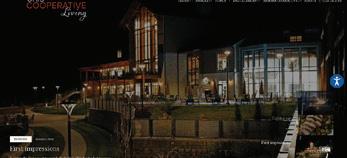
36
MEMBER INTERACTIVE
Generations: Co-op members share four, five, and even six generations in family photos. Visit


across the state.
Resilience and rebuilding

Co-ops plan their return to Farm Science Review after a tornado ripped through their iconic facility.
BY AMY HOWAT
The Ohio's Electric Cooperatives Education Center has been an iconic presence at Farm Science Review.......

Continued on page 6
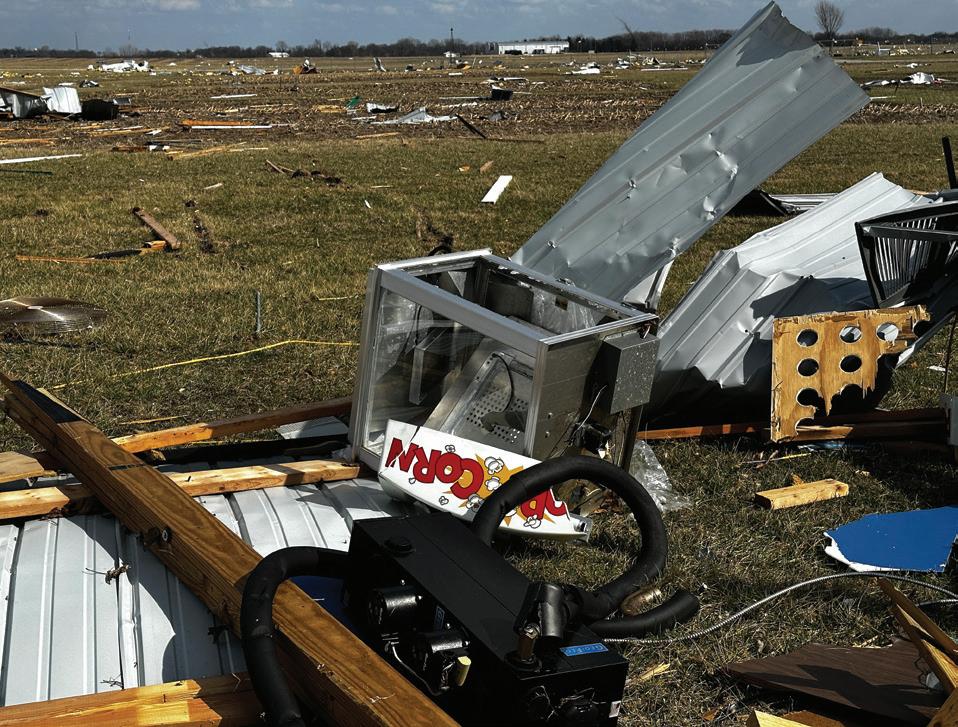
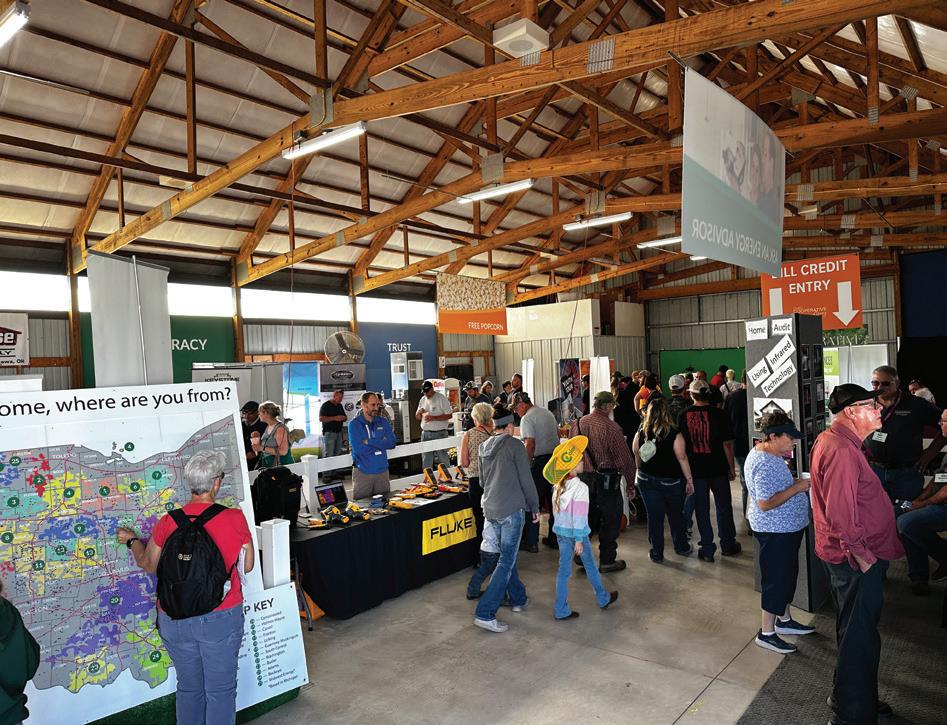

“Our new building will be essentially the same structure, but with some upgrades,” Kidwell says. “Once we saw the way the tornado destroyed the old one, we decided to update the building method.”
The new building, expected to be completed by Sept. 1, will allow Ohio’s electric cooperatives to once again showcase advances in efficiency, safety, and renewable energy.
“One of our goals is to promote energy efficiency,” Kidwell says. “We’ll have vendors demonstrating geothermal energy solutions, insulation, heat pump options, and other products and services to help people be more efficient.” In addition, energy advisors from several Ohio co-ops will be available to answer questions, and co-op lineworkers will provide popular live-line safety demonstrations. Visitors will have a chance to learn about youth programs and test their knowledge about electricity and cooperatives to receive
useful prizes like rain gauges — and co-op members can drop off the entry form in the back of this magazine for a chance to win a $100 credit on their electric bills.
“We are working hard and we’re committed to getting the building and displays completed, to represent cooperatives and be there for members and the public,” Kidwell says.
This year’s Farm Science Review will emphasize the message of resilience, Zachrich says. “As we rebuild, we’ll be making improvements in infrastructure, planning for the future and not just today,” he says. “Our educational efforts from OSU and extension educators will look at what farmers can do to prepare themselves as we see more and more tornadoes, and if it does happen, how to respond so their business isn’t majorly affected.
“Resiliency is real life for farmers and this year, we’re right here experiencing it, too.”
Farm Science Review, Molly Caren Agricultural Center, 135 St. Rte. 38 NE, London. 8 a.m.–5 p.m. Sept. 17–18 and 8 a.m.–4 p.m. Sept. 19. Tickets are $10 online, at county OSU Extension offices, and at participating agribusinesses and $15 at the gate. For more information, visit fsr.osu.edu.
Continued on page 6
Caption for all photos on this page? Maybe one below..



WOODS, WATERS, AND WILDLIFE
River crossing
A brief history of the mighty Ohio
The Shawnees called it Spaylaywitheepi. When French traders and trappers arrived during the 18th century, they described it as the Iroquois had: La Belle Rivière — the beautiful river. Of course, the name we most closely associate with it today derives from the Seneca word Ohiyo: “good river.”
The Ohio River flows northeast to southwest for 981 river miles — 451 miles of which delineate the state of Ohio’s borders with West Virginia and Kentucky. It begins in Pittsburgh, Pennsylvania, formed by the confluence of the Allegheny and Monongahela rivers, and ends by emptying into the Mississippi at Cairo, Illinois. (By the way, the locals pronounce Cairo as KAYrow, not KI-row.)
Seeing the Ohio today, it’s difficult to believe that, in its original state, the river was a naturally shallow stream, varying in depth from only about 3 to 20 feet. And during annual periods of low water, such as late summer and early fall, a person could literally walk
Home of monsters

across the Ohio River on the stream’s bottom at many spots. You’d certainly get wet, possibly up to your waist or so, but the feat could be accomplished.
Of course, during other seasons of the year, the Ohio could turn into a raging torrent with flood waters easily doubling or even tripling the river’s size and depth. Scoured from its banks during such times were giant boulders, whole trees, even settlers’ log cabins ignorantly built too close to the shoreline. Not surprisingly, the Ohio River’s drainage basin is huge, gathering water from nearly 190,000 square miles across six states.
Then in 1885, construction began on the first of 19 dams (nine of which are contiguous to the state of Ohio) that raised the water level of the river significantly to expedite both trade and travel.
As a result, the Ohio River today is essentially a string of deep, slow-moving reservoirs connected by the
One of the aspects of the Ohio River that has not changed through the years is the size of its trophy catfish. Although there may not be as many as during pioneer times, they are just as big and heavy.
In fact, just this year, on April 7, 15-year-old Jaylynn Parker of New Richmond, Ohio, caught a blue catfish from Twelve Mile Creek, a tributary of the Ohio River, that weighed a whopping 101.11 pounds — besting the previous state record by more than 5 pounds. The giant cat, which measured nearly five feet in length (56 5 inches) with a girth of 39.5 inches, was kept alive, weighed on a certified scale, then released. Before Jaylynn landed hers, the record had been held by Chris Rolph of Williamsburg, Ohio, who caught his fish from the Ohio River near Cincinnati on June 11, 2009

STORY AND PHOTOS BY W.H. “CHIP” GROSS
crossing

massive locks associated with those dams, which raise and lower boats and barges from pool to pool.
Another historical aspect of the river that has changed due to the higher modern-day water level is the once-impressive Falls of the Ohio, the only natural obstruction in the river’s entire length, where, on October 4, 1803, Meriwether Lewis met William Clark to begin their famous expedition westward.
Located at Louisville, Kentucky, the “falls” were not a vertical drop like Niagara Falls, but a 2 5-mile-long series of treacherous, rock-filled rapids that dropped 26 feet from start to finish. Unfortunately for river lovers, most of the original falls are now under water.
A state-of-the-art interpretive center, located on the Indiana side of the river at Falls of the Ohio State Park in Clarksville, does an excellent job of explaining the changes and is definitely worth a visit.
W.H. “Chip” Gross is Ohio Cooperative Living’s outdoors editor. Email him with your outdoors questions at whchipgross@gmail.com.
A statue of Meriweather Lewis and William Clark at Falls of the Ohio State Park in Clarksville, Indiana, commemorates the start of the pair’s expedition into the Northwest Territory.

Butterfly rescue
Co-op members do their part to help monarchs continue their cycle of life.
BY MARGIE WUEBKER
While beautiful orange-and-black monarch butterflies still flutter around area lawns and gardens between May and September each year, their numbers have declined over the years because of some combination of environmental conditions, herbicide and pesticide use, and loss of suitable habitat.
A few electric cooperative members are doing what they can to help the migratory visitors.
“I remember seeing lots of butterflies in my younger days,” says 90-year-old Alvin Brown, a retired dairy farmer who resides near New Bremen. “There aren’t nearly so many nowadays, so we have to do what we can to help.”
Like Brown, Coldwater resident Norma “Skeet” Wolters became interested in helping the monarchs long before the Union for Conservation of Nature declared the species endangered in 2022. Having been involved in the Mercer County 4-H program for more than two decades, she often included butterflies in her nature presentations.
The sight of a monarch butterfly laying her eggs on a milkweed plant sparked a similar interest for St. Marys resident Julie Metz in 2020. She quickly turned to the internet for more information and found a “whole world” of people raising butterflies.

How to raise monarch butterflies
1. Make sure your yard includes host plants like milkweed, on which butterflies lay eggs and caterpillars feed.
2. Collect caterpillars from leaves of the host plant using a stick or twig from the plant. Do not touch them with your hands, as any bacteria could cause them infections.

3. Place caterpillars in a clean and well-ventilated container but do not overcrowd. Ideally, the container should have fine wire mesh sides to allow the caterpillars to cling.

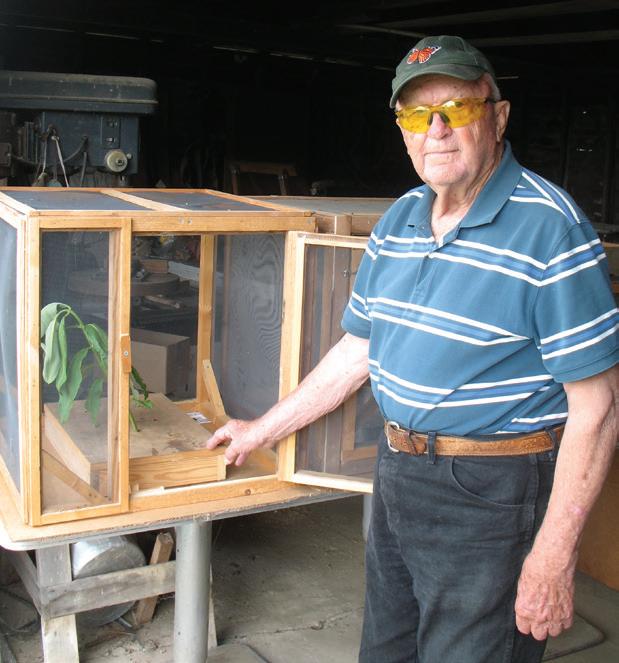




All three conservationists are members of St. Marys-based Midwest Electric.
Brown says monarchs like sweet red clover and milkweed, and when he sees butterflies savoring the clover, that’s when he begins to check the underside of the nearby milkweed leaves, where female monarchs can lay up to 300 eggs, each roughly the size of a grain of rice.
Metz collects the eggs and places them in special containers away from predators like spiders and flies. Five days later, tiny caterpillars emerge. The caterpillars then go into mesh-sided containers to continue their life cycle.
“Those caterpillars eat milkweed like crazy,” Metz says. “That is the problem. The widespread use of herbicide has killed much of the milkweed they need.”
Brown gathers tiny caterpillars from the milkweed patch and places them in large screened-in cages. His handbuilt cages are different from commercial cages in that he has devised a water source to make sure the milkweed inside stays fresh and green.
The caterpillars increase roughly 2,000 times in size due to their constant eating over a span of two to three weeks. The metamorphosis continues when the plump caterpillars climb to the top of the cages and spin a
chrysalis, or pod, from which a butterfly emerges a week or two later.
Among the three of them, they have released hundreds upon hundreds of butterflies over the years. Recently, Brown released some at nearby German Protestant Cemetery as a tribute to Sandra Thieman, who gave the butterfly presentation all those years ago that originally sparked his interest. Thieman’s family was present for the occasion. He has also released butterflies to the oohs and aahs of children attending various camps and vacation Bible schools during the summer.
Wolters has made releases at a local park as well as in her backyard — much to the delight of neighborhood children. Metz usually heads to the Kuenning-Dicke Natural Area near New Bremen.
“I like to think I’m making the world a better place when I release those little guys,” Metz says. “They are eager to spread their wings and get out in the world.”
Brown stresses that anyone can play a part to help the vibrant visitors thrive. “We can plant milkweed and sweet red clover,” he says. “We can limit the use of herbicide and pesticide around their habitat.”
4. Make sure to provide plenty of fresh milkweed as caterpillars are voracious eaters. They do not like dried or wilted leaves.
5. Clean the cage frequently to remove waste known as frasse.
6. Wait while the caterpillar forms a chrysalis, taking care to protect it from predators and weather conditions.

7. Release butterflies when they emerge from the chrysalis, preferably on a sunny day in the backyard. a park, or a nature center.
Alvin Brown of New Bremen, left, displays his homemade butterfly box. Norma “Skeet” Wolters, right, checks on the milkweed she grows in her flower bed (photographs by Margie Wuebker).























GOOD EATS
Southern comfort
Welcome new neighbors, support a sick friend, or just indulge — Southern fare is good for what ails you!
SKILLET-FRIED CHICKEN
Prep: 15 minutes | Chill: 8 hours | Cook: 30 minutes | Servings: 6
Overnight
1 cup buttermilk
1 teaspoon salt
1 teaspoon pepper
3 to 4 pounds bone-in, skin-on chicken

Dredge
1 cup buttermilk
1 large egg
1-ounce packet ranch dressing powder, split in half
Coating
2 cups flour
3 tablespoons cornstarch
remaining ranch dressing powder
1 teaspoon paprika
1 teaspoon garlic powder
1½ teaspoons salt
½ teaspoon cayenne (optional)
1 teaspoon pepper
48–64 ounces peanut oil for frying
In a shallow container with lid, combine “overnight” ingredients; submerge and coat chicken in liquid. Cover and soak overnight. When ready to fry chicken, whisk “dredge” ingredients together (using half of the ranch dressing powder) in a container easy for dipping chicken pieces into. Pour excess overnight mixture from chicken into dredge and mix again. In a separate container easy for rolling chicken pieces in, mix the “coating” ingredients.
Heat oil to 325 F in a large stainless-steel or cast-iron pot over medium/medium-high heat. Working with one piece at a time, roll chicken in coating, then dip in dredge, then roll in coating once more, shaking off excess after each step. Set coated pieces on a large plate. When all have been coated and oil is ready, roll each piece in coating once more to cover any damp spots just before frying. Fry two or three pieces at a time, turning until golden on all sides and internal temperature reads 165 F. Remove from oil with heat-safe tongs. Oil temperature will fluctuate; adjust accordingly to keep it between 300 F and 325 F. Let chicken cool on wire rack set over a baking sheet to catch excess oil. Once the last piece of chicken goes in, pour a little dredge into leftover coating mixture and form into small pieces. Fry them up for crispy “batter bites.”
Per serving: 410 calories, 36 grams fat (7 grams saturated fat), 26 milligrams cholesterol, 860 milligrams sodium, 22 grams total carbohydrates, 1 gram fiber, 31 grams protein.
RECIPES AND PHOTOGRAPHS BY CATHERINE MURRAY
OLD-FASHIONED
BANANA PUDDING
Prep: 25 minutes | Bake: 10 minutes | Servings: 6
3 large eggs at room temperature
½ cup sugar
1/3 cup flour
pinch salt
2¼ cups whole milk
2 tablespoons unsalted butter
1 teaspoon vanilla extract
8 ounces vanilla wafers
4 large ripe but firm bananas
¼ heaping teaspoon cream of tartar
½ teaspoon vanilla extract
¼ cup sugar
Separate eggs; place yolks into a medium heatproof bowl and whites in a large mixer bowl. Set aside. In a medium saucepan, whisk together ½ cup sugar, flour, and salt. Slowly whisk in milk. Cook and whisk over medium-high heat until thickened and bubbly. Reduce heat; cook and stir 2 minutes longer. Remove from heat.
Stir a small amount of the hot milk mixture into egg yolks to temper, then mix in the rest. Return all to pan; bring to a gentle boil for 2 minutes, stirring constantly. Remove from heat again and stir in butter and 1 teaspoon vanilla. Set aside to cool. In an ungreased 9-inch square baking dish, layer half the vanilla wafers, bananas (cutting in ¼- to ½-inch slices as you go), and custard. Repeat layers.
Preheat oven to 350 F. For meringue, beat egg whites, cream of tartar, and vanilla on medium speed until soft peaks form, about 5 minutes. Gradually beat in sugar, about a teaspoon at a time, on high until stiff peaks form and the surface is smooth and glossy, 5 to 7 minutes. With a spatula or spoon, dollop meringue over custard, creating peaks and sealing to the edges. Bake 8 to 10 minutes, until meringue tips are golden brown. Cool 30 minutes. Serve at room temperature or chill in refrigerator first.
Per serving: 501 calories, 15 grams fat (6 grams saturated fat), 117 milligrams cholesterol, 234 milligrams sodium, 83 grams total carbohydrates, 3 grams fiber, 10 grams protein.
CHEESY GRITS AND GREENS
Cook: 20 minutes | Servings: 4
1 cup quick-cooking grits (and water according to package directions)
1 teaspoon chicken or vegetable bouillon
6 ounces finely shredded sharp cheddar cheese
3 large bunches of collard, mustard, and/or dandelion greens, washed and de-stemmed
2 tablespoons bacon fat or butter
1 small yellow onion, diced
4 cloves garlic, minced
1 tablespoon apple cider vinegar
½ teaspoon Cajun, Creole, or Old Bay seasoning
¼ teaspoon red pepper flakes (optional)
Mustard greens have a spicy and tangy flavor, while dandelion greens are earthy and bitter, similar to arugula or radicchio. Collard greens are quite mild, similar to cabbage. With careful multitasking, the grits and greens can be prepared simultaneously.
Cook grits according to package directions, mixing bouillon into the boiling water. When cooked, stir in shredded cheese until melted. Remove from heat and cover with lid. In a large pot over medium heat, sauté onion in bacon fat or butter for 5 to 7 minutes until soft. Add garlic and saute a minute more. Stir in greens and vinegar until wilted. (If needed, add a bit of water to encourage greens to steam.)
Mix in seasonings, cover, and simmer on low for 5 minutes. Divide grits across 4 bowls and top with greens.
Per serving: 381 calories, 21 grams fat (10 grams saturated fat), 44 milligrams cholesterol, 700 milligrams sodium, 36 grams total carbohydrates, 7 grams fiber, 17 grams protein.


Check it out! See videos of some of our mouth-watering recipes being prepared at
COCA-COLA CAKE

Prep: 30 minutes | Cook: 30 minutes | Servings: 18 to 24
2 cups flour, spooned and leveled
2 cups sugar
½ cup cocoa powder
1 teaspoon baking soda
¼ teaspoon cinnamon
½ teaspoon salt
½ cup unsalted butter
½ cup vegetable oil
1 cup Coca-Cola
½ cup buttermilk
1 teaspoon vanilla extract
2 large eggs, lightly beaten Icing
½ cup unsalted butter
½ cup Coca-Cola
1 teaspoon vanilla extract
½ cup unsweetened cocoa powder, sifted
3 cups powdered sugar, sifted
Optional toppings: whipped cream, cherries
Place flour and sugar in a large bowl, then sift and mix in cocoa powder, baking soda, cinnamon, and salt. Set aside. In a medium saucepan on high, melt and combine ½ cup butter, vegetable oil, and 1 cup Coca-Cola. Bring to a boil and remove from heat.
Preheat oven to 350 F. With a spatula, mix the Coca-Cola mixture into the flour mixture, then buttermilk and vanilla, then eggs. Pour batter into a greased 9x13-inch baking dish. Bake approximately 30 minutes or until toothpick comes out clean. Cool on wire rack.
While cake is still warm, prepare icing. Place the same saucepan over medium heat; melt ½ cup butter with ½ cup Coca-Cola and vanilla. Whisk until smooth, then remove from heat. Whisk in cocoa powder and powdered sugar 1/2 cup at a time until dissolved. Pour icing over warm cake. Allow to cool completely before slicing and serving. Per serving: 260 calories, 9.5 grams fat (3.5 grams saturated fat), 26 milligrams cholesterol, 97 milligrams sodium, 44 grams total carbohydrates, 1 gram fiber, 2 grams protein. www.ohiocoopliving.com




MESSAGE FROM THE GENERAL MANAGER
EPA’S POWER PLANT RULE THREATENS ELECTRIC RELIABILITY

Ted Holsapple GENERAL MANAGER/CEO
Here at Darke Rural Electric Cooperative, our mission is simple: ensuring reliable electricity at a cost our members can afford. Transparency is key to how we operate. Alongside celebrating our successes, we believe it's crucial to share the challenges we face.
In May, the U.S. Environmental Protection Agency issued a rule that affects energy production from power plants. The power plant rule will undoubtedly threaten access to reliable electricity for our local community and communities across the country.
The rule constrains existing coal and new natural gas plants by requiring them to install carbon capture and storage (CCS) — a technology that has potential but has not been proven to be viable as required. No power plant in North America currently uses CCS at the scale and levels mandated by EPA. When power plants can’t comply with EPA’s CCS requirements, they will be required to shut down, significantly limit operations, or switch fuels. These unrealistic standards will force the unnecessary and early shutdown of many power plants that currently provide reliable electricity 24/ 7, including the coal-fired Cardinal Power Plant in Brilliant, which supplies more than 80% of the power for Ohio’s electric cooperatives.
Renewable sources, such as solar and wind, are important components of our overall generation mix. But given the intermittent nature of these energy sources, we simply cannot depend on them because the wind doesn’t always blow and the sun doesn’t always shine. The need for always-available power generating resources is still essential.
The timing of the power plant rule is equally troubling. At the same time the EPA is leading our nation down the path to fewer power plants, utilities are facing a surge in electricity demand — driven by the onshoring of manufacturing, the growth of the American economy, and the rapid expansion of data centers to support artificial intelligence, e-commerce, and cryptocurrency.
Many states have already experienced rolling outages, and if the supply of electricity is further threatened by the EPA’s power plant rule, the problem will only get worse. In fact, the North American Electric Reliability Corporation, the nation’s electric reliability watchdog, recently forecasted that over the next five years, all or parts of 19 states are at high risk of rolling power outages during normal peak electricity demand conditions.
It’s also no secret that when demand is high and supply is low, costs go up. We’re concerned about threats to reliability as well as cost increases to our members.
I don’t say all of this to worry you, but I do want our members to understand the challenges that lie ahead. Just as we’ve always done, we will look for solutions that serve our members best. We are joining electric co-ops across the country to fight these regulations, and we are working with our local elected officials to help them understand the consequences this would have on all Ohioans.
Co-ops are no strangers to innovation, and we’re taking proactive steps to address today’s energy challenges and tomorrow’s energy needs. We’ll continue to explore new technologies and strategies that bolster reliability and our local grid.
Electric cooperatives like Darke Rural Electric Cooperative deliver power to 42 million Americans. At the end of the day, our top priority is to meet our members’ energy needs, and we must have reliable electricity available to do that.
If you’re interested in learning more about policy impacts to power reliability, or to make your voice heard on this matter, visit voicesforcooperativepower.com.
Darke REC and Butler REC Exhibitor Picnic Preble County Junior Fair host
On move-in day of the Preble County Fair, Darke Rural Electric Cooperative and Butler Rural Electric Cooperative came together to host a special exhibitor picnic for fair exhibitors and their families. This initiative demonstrated the cooperatives’ commitment to the principle of “Concern for Community.”
The cooperatives provided each exhibitor and family member with a hot dog, chips, a cookie, and water, offering a simple yet appreciated meal during the busy day. This picnic was not just about food; it was a way for the cooperatives to show their support and appreciation for the hard work and dedication of the fair participants.
Darke REC and Butler REC believe in the sustainable development of their communities. By supporting events like the Preble County Fair, they help

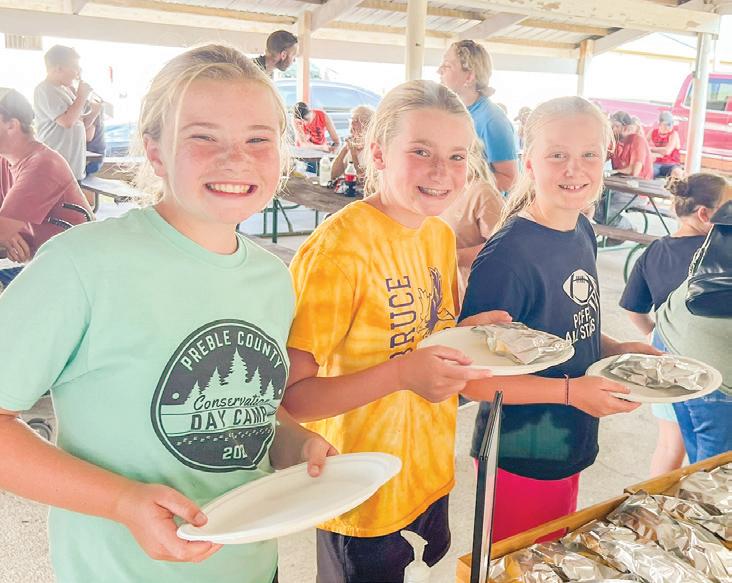
youth develop into better citizens, leaders, and communicators through programs like 4-H and FFA.
“We are proud to support our youth and their families,” said Jennifer Davenport, director of communications and member relations for Darke REC. “Events like the Preble County Fair are vital in helping our young people grow and develop, and we are honored to be a part of that journey.”
The picnic was well received, providing a moment of rest and enjoyment for families amidst the busy preparations. It highlighted the importance of community support and the positive impact it can have.
Darke REC and Butler REC congratulate all exhibitors for their participation and achievements at this year’s fair. Their dedication and hard work are a testament to the strength and spirit of the community.
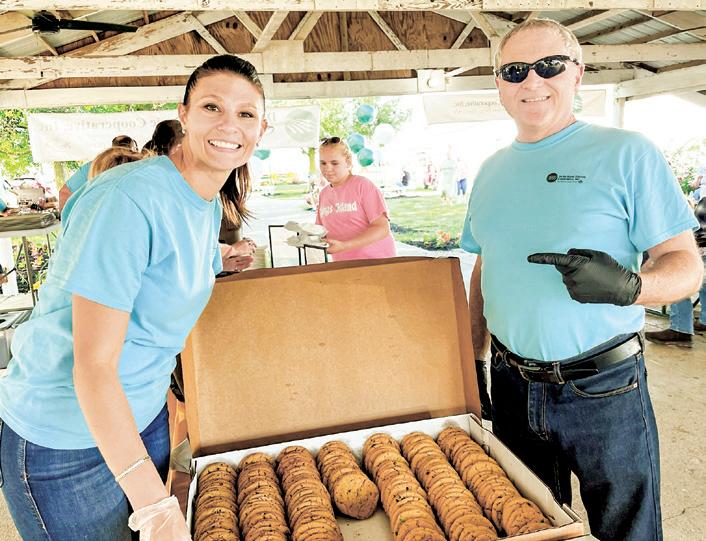
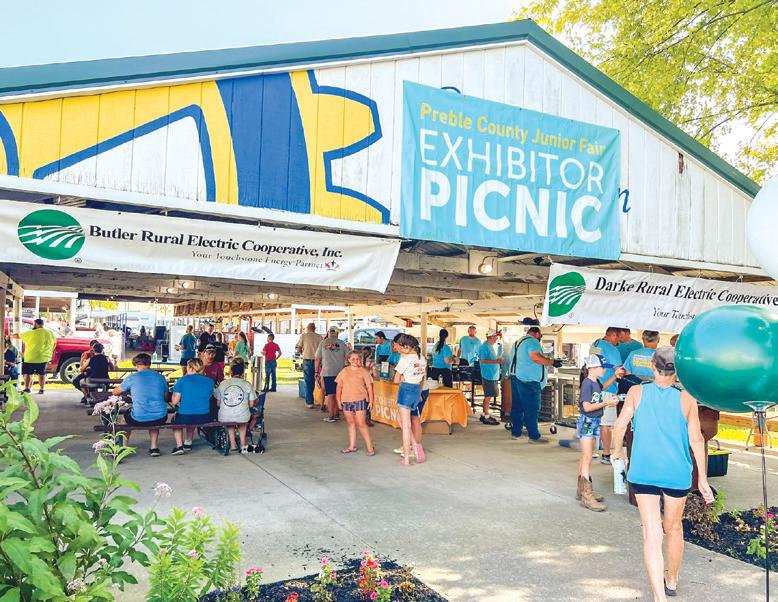


The Value of Your
DARKE RURAL ELECTRIC MEMBERSHIP
3 reasons why your cooperative membership is valuable:
Focused on Reliability
Over the past 20 years, Darke REC has made significant investments in electric system upgrades to ensure our members have 24/7 access to reliable, affordable electricity.
Committed to Our Community
Being owned and driven by the communities we serve is a commitment Darke REC takes seriously. Each year, your electric co-op invests in youth scholarships and community activities to enrich the lives of our members.
Clear & Helpful Communication
We strive to keep our members informed at all times. That’s why Darke REC sends quarterly member newsletters, provides a variety of payment options, and posts regular updates online. Plus, our friendly staff is always ready to help. As a Darke REC member, for only $1, you could: Use a computer for 21 hours





Do you have a standby generator? Thinking of installing one? You must notify Darke Rural Electric.
Storm-related outages may prompt you to consider buying a standby electric generator. We understand members' needs to keep electric power going to their homes, farms, or businesses, and remind you to use extreme caution when installing and using a standby generator. If used incorrectly, a generator can cause serious harm or even death. Below are some important safety tips for generators.
Generators can produce power to a home’s 120/240-volt service, but if a generator is not properly installed, the “backfeed” will result in an output of 7,200 volts on the distribution line (much higher than what it should carry). This could seriously injure or kill a lineman trying to restore power, even if the lineman is miles away from the generator.
Generators need to be isolated from the electric power lines. This means you should connect appliances or other devices directly to the generator with the appropriate-sized cords. You must also install an appropriate double-throw switch on your generator to separate your service from the co-op’s system. This switch will isolate your generator from the cooperative’s power supply lines whenever it is generating current, to prevent electricity from backfeeding current onto our lines and endangering our personnel.
Remember to determine the wattage output you need before buying a generator. The generator’s wattage output
Yes, I have a standby generator at my service location.
should at least meet or exceed the total rated watts of the appliances you will operate in the case of an outage.
Know your generator. Read installation instructions and safety and maintenance information, and most importantly, follow all manufacturer’s recommendations!
When you need to use your generator, turn off the main power switch or breaker in your home.
Never overload the generator. It should only be used when necessary and only to power essential equipment. Overloading will cause wear and tear on the generator and could present fire and safety hazards. Be careful when fueling your generator! Never try to refuel the generator while it is operating.
If installed inside, make sure there is proper ventilation and air cooling to prevent overheating and the accumulation of toxic exhaust fumes.
We want to maintain a safe environment when it comes to standby generators, for the sake of our line crews and our members. If you currently have a standby generator, please help us update our records by completing the information below and returning it to: Darke Rural Electric Cooperative, P.O. Box 278, Greenville, OH 45331. (You don't need to send the form if you've previously notified the co-op of your generator.)
Service address: __________________________________________________________________
Size of generator: ___________________ Do you have a double-throw switch? _____yes _____no
BOARD OF TRUSTEES
District 1: Aaron Siefring
District 2: David Coons
District 3: Tod Carroll, V.P.
District 4: Michelle Marker, Sec./Treas.
District 5: Robert Godown
District 6: Steve Vanzant
District 7: Matt Webster, President
GENERAL MANAGER/CEO Ted Holsapple
p.m.
Your electric bill is due the 10th of each month. If you do not receive your bill, it is your responsibility to contact the office before the due date.
Office, nightdrop, mail, online banking, recurring payment, SmartHub, or phone.
Look! the sky Up in

Air shows have been a staple at local strips around the country pretty much since the invention of flight.
On the following pages, we highlight high-flying fun at two Ohio events this month that exemplify that barnstorming spirit.
BY MARGIE WUEBKER

VThe WACO fly-in at Troy shows
off local aviation
history
intage aircraft are a common sight in the sky above and along County Road 25A at the south edge of Troy in Miami County — especially during late September, when the WACO Air Museum and Learning Center hosts its annual fly-in.
The center’s executive director, Nancy Royer, says nearly 100 “birds” flew in to last year’s 100th anniversary event, and she hopes to attract similar numbers at this year’s show Sept. 20 through 22. Events start at 9 a.m. each day.
Plans call for flyovers, displays, entertainment, a candy drop, vintage car show, and food trucks. Like other select weekends during the spring, summer, and fall, pilots will be offering flights (for a fee) in their open-cockpit biplanes.
through the history of Troy and Miami County, which were at the forefront of the aviation history.”
WACO (Weaver Aircraft Company) in Troy was the largest manufacturer of biplanes in the country during the late 1920s and early 1930s. Buck Weaver, a civilian who instructed military pilots in Texas during World War I, and friends Clayton Brukner, Sam Junkin, and Charlie Meyers founded the company in 1920.
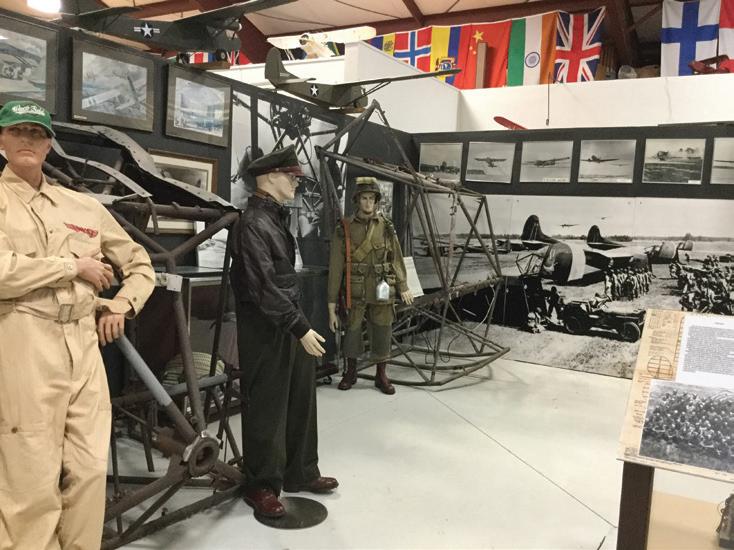
Their first design, dubbed “The Cootie,” holds a place of honor in the museum. Brian Meyer, a member of the WACO Historical Society, built a flying replica of the aircraft — relying entirely on photographs since none of the original models remained.
“The fly-in gives us a chance to show off our facility,” Royer says. “It is here that people can walk
Between 1925 and 1927, the company’s owners continued to improve their designs. Many of the 250 WACO Model 9s manufactured in that time were used to haul mail from place to place. More success came with the WACO Model 10.

According to Royer, it was the choice of barnstormer pilots in the 1930s and became known as a new pilot’s best friend. Though the company failed to secure a contract to produce military trainer planes, its UPF-7 was chosen by Civilian Pilot Training Schools and produced 600 of them for that purpose. WACO did win a contract to build gliders after the Army Air Corps decided it needed aircraft to quickly move heavy loads of military personnel, jeeps, and other equipment into battlefield locations, and more than a thousand were built in Troy. “WACO’s gliders flew in 28 countries,” Royer says.
handling subcontractor duties, and building products including turrets, bomb dollies, and log splitters.
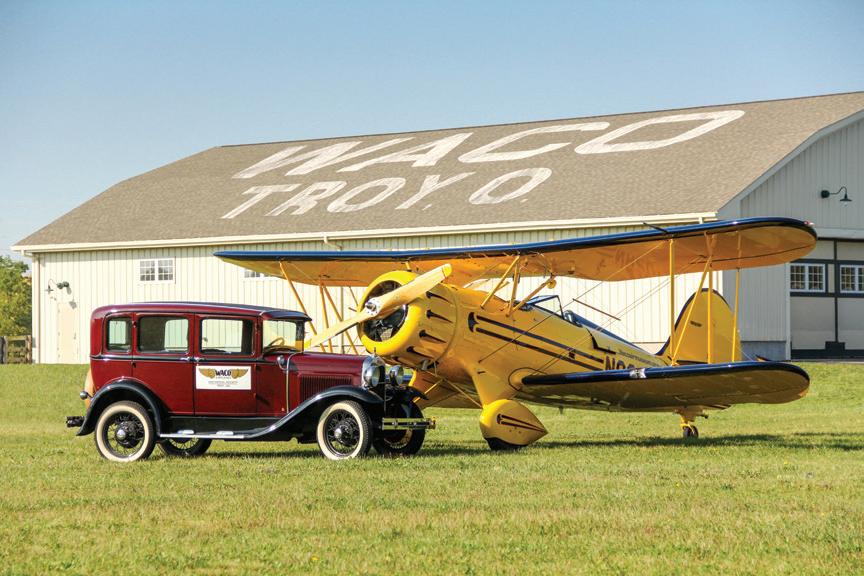

Post-war years were not kind to the company, and the last plane rolled off the assembly line in 1947. However, WACO continued for another 15 years doing metalwork,

The company occupied nine buildings and boasted a workforce of 2,000 in its heyday. Former employees and local citizens wanted to preserve and honor the area’s contribution to aviation, and established the WACO Historical Society in 1979.
The first museum opened in the downtown area the following year with the current site opening in 1997. Today, along with its 2,400-foot grass airstrip reminiscent of the 1930s, the site has two large hangars full of vintage aircraft — including “Sunni,” a classic biplane representative of the Golden Age of Aviation. A small theater shows World War II gliders in action and a learning center hosts various aviationrelated camps and youth programs.
The museum, located at 1865 S. County Road 25A, Troy, is open Monday, Tuesday, Thursday, and Friday, 9 a.m. to 3 p.m. and Saturday and Sunday, noon to 5 p.m. There is an admission charge. Check the website at WACOAirMuseum. org or call 937-335-9226 for more information.

A skydiving Santa and a flying mower are among the highlights at the state’s
air show largest free
BY JAMIE RHEIN
Technically, the Vinton County Air Show has been around longer than the Vinton County Airport has been open. The first was in 1969, the year after the runway was built near McArthur as part of Gov. James Rhodes’ initiative to build an airport in every county in the state, but two years before the airport’s grand opening.
By the early 1990s, though, despite the popularity of the air show, the airport itself struggled, and looked as if it might close. That was when the Vinton County Pilots and Booster Association jumped into action.
The group of locals with a passion for aviation has managed and maintained the airport and its 3,750-long runway since 1992. The air show — now one of the longest-running non-military, free air shows in Ohio — is its largest source of funding (the air show itself is free; boosters raise money by asking for parking donations and serving one of the best chicken dinners around).
The third Sunday each September, the Vinton County Air Show draws spectators by the thousands in search of family fun, highlighted by daredevil stunts, highflying aerobatics, and a skydiving Santa Claus.
From vintage WWII planes like the 1947 North American Navion and a Chinese Yak to a 1970s two-passenger Cessna 150, these beauties draw plenty of admiration from onlookers. A Blackhawk helicopter and Ohio University’s DC3 provide the thunder, while paragliders and all sorts of model planes make for a quieter attraction.
Each year, “the most popular plane isn’t a plane,” says Rupert. “It’s a flying lawnmower.” Operated by Roger Barns, the radio-controlled lawnmower buzzes along the runway before taking off to dazzle with airborne antics like flying upside down.
Another highlight is the air show’s skydiving team, the Screaming Chickens (named for the show’s infamous chicken dinners). Bob Church and Ted Williams start off the show with the first dive. Church builds smoke on his feet before he jumps to help folks follow him as he spirals his way to the earth (the bright jellybeancolored stripes of his parachute are hard to miss as well). Williams follows with a large American flag that flutters behind him in a patriotic howdy.
The most memorable — iconic, even — part of the skydiving show is the finale: First, a low-flying


airplane drops hundreds of pieces of candy on the runway for children to scramble in and gather up the bounty. That’s followed by Church’s last jump, wearing (what else?) a Santa Claus suit — as if the merry old elf is making an early scouting visit from the North Pole.
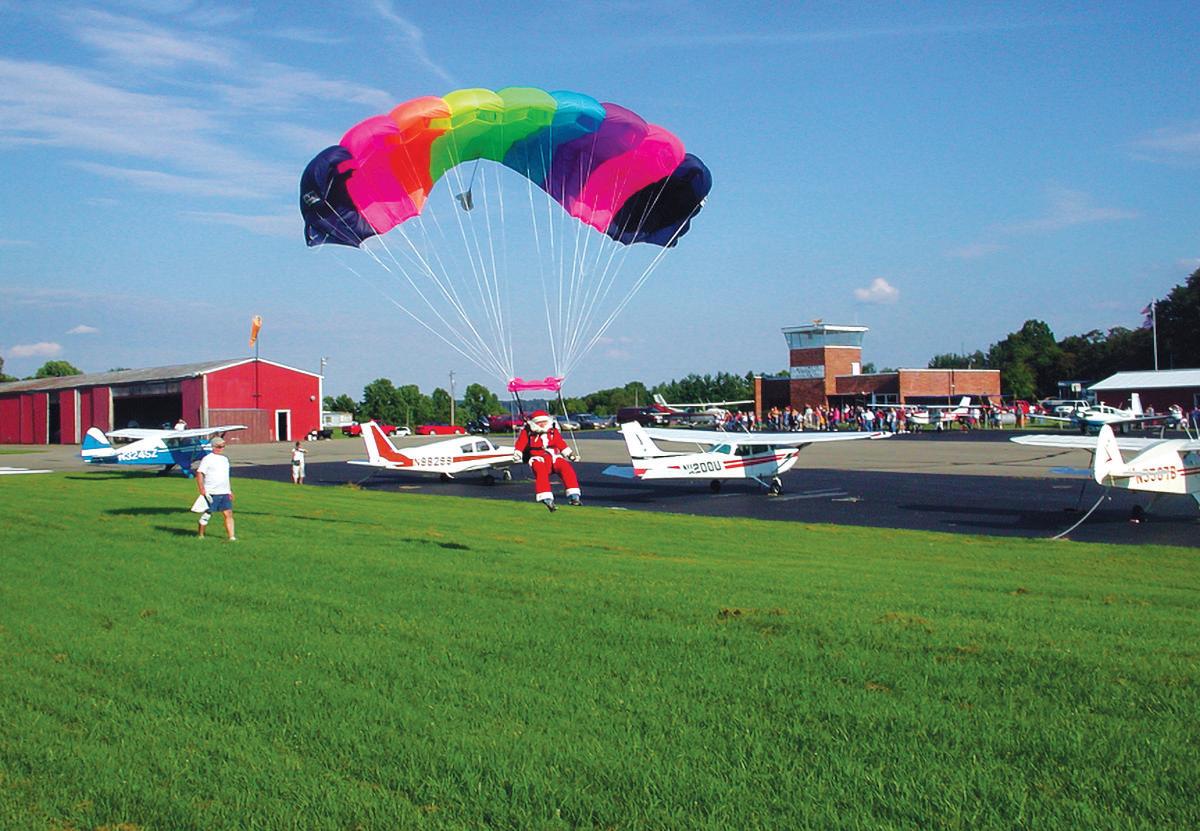
Church has jumped in about every Vinton County air show since the early 90s.
That chicken dinner though! As early as 5 a.m. on show days, the McArthur Eagles Club fires up the largest barbeque pit in southeastern Ohio. The 45-foot-long pit sizzles with half-chickens slathered with secret sauce until the dinners sell out. Andy Adelman, who has cooked up chicken since the show’s early days, isn’t giving up the recipe. Dinners come with baked beans, potato salad, and a roll. Some drive the miles to the air show for the chicken alone — Rupert swears it is that good. He makes sure each pilot who performs gets one, since they all volunteer their time to the airport’s cause.
Another aim of the air show is to entice more folks to become pilots themselves. Association members Harry Sowers and Fred Hawk, both flight instructors, give short airplane rides after the air show. Sowers, who started flying at age Scenic Air Tours out of the Vinton County Airport, vouches on the affordability of flying lessons: “It’s cheaper than golf.”
Over the years, proceeds from the air show have been used to build a shelter house, buy fuel tanks, and, with a matching grant from the FAA, repaint the runway.
If you go
The show starts at 1 p.m. on Sunday, September 15. Although the admission is free, the suggested donation for parking is $10. The access to the airport during the show is via State Route 328 to Airport Road East.


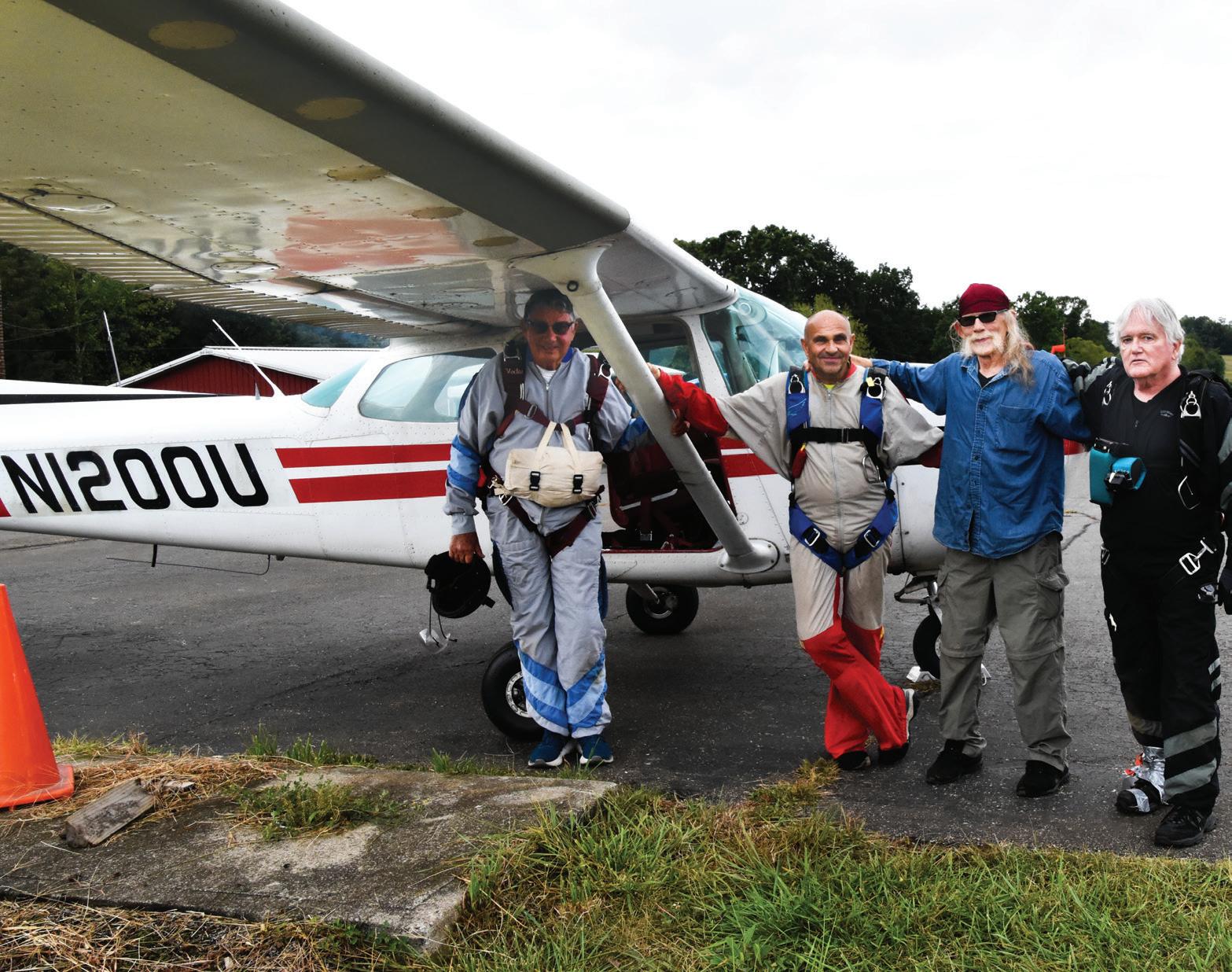


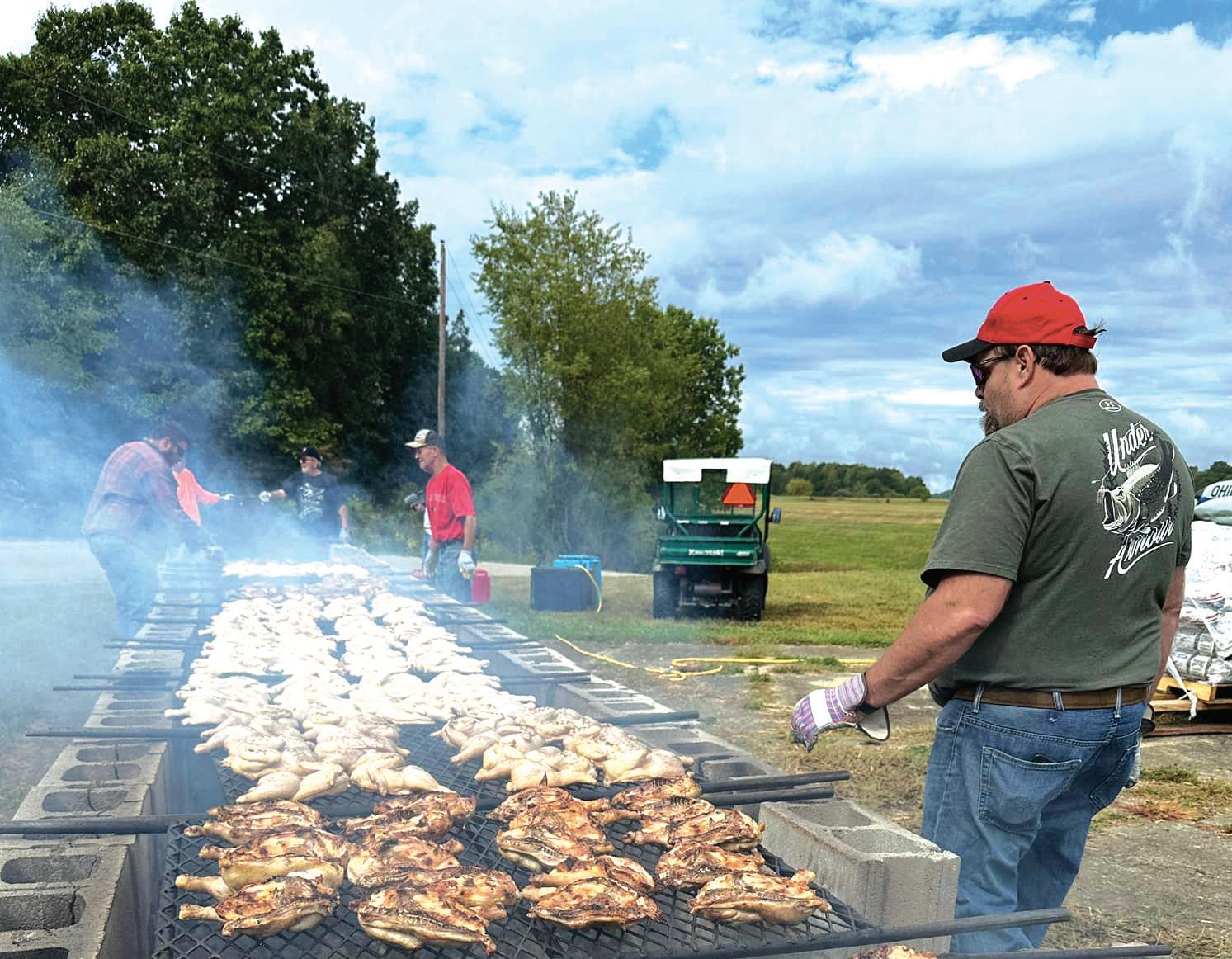
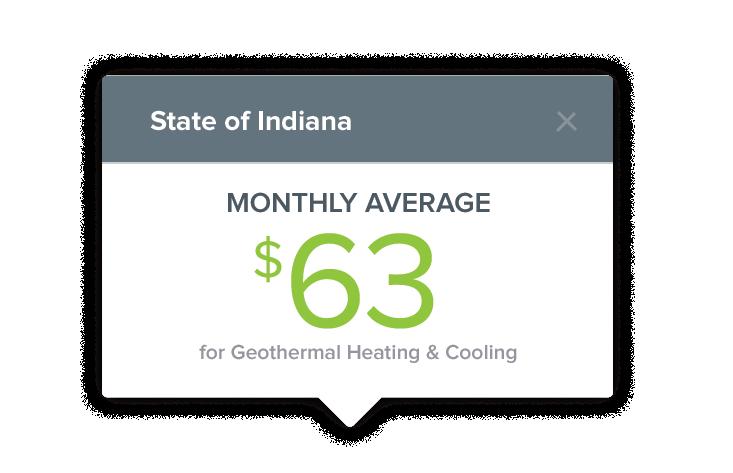




Did you know the average WaterFurnace homeowner pays only $63/mo for their heating and cooling?
WaterFurnace homeowners across the country are reaping the benefits of geothermal heat pumps, which are 2X more efficient than air source heat pumps, furnaces, or air conditioners. With up to 70% lower heating, cooling, and hot water costs, a ground source heat pump is the only heating and cooling technology that actually pays you back over time. To learn more about how a geothermal system could save you money, contact a WaterFurnace dealer today.



VALUE YOU CAN COUNT ON




ADVOCACY
We advocate for agriculture with legislators, regulators, in the courts and with the media.
LEVERAGING TRENDS
Members have access to the Ag Intelligence Service to gain insight on how to best position their farm for the future.
MONEY-SAVING BUSINESS SOLUTIONS
Members save by accessing our Health Benefits Plan, Workers’ Comp Group Rating Program, and Energy Program.
PROTECTING WHAT MATTERS MOST


PERSONAL AND PROFESSIONAL GROWTH
Farm Bureau helps you collaborate with the best and build relationships to keep you ready for the next innovation or issue.
INDUSTRY EXPERTS
Members receive unique insights on water quality, energy, animal care standards, agriculture legislation and landowner rights.

Through our partnership with Nationwide, members can access products and services that protect their families, homes and farms.
YOUR LOCAL WATERFURNACE DEALERS:
Ashland Comfort Control (419) 281-0144 comfortcontrolohio.com
Bowling Green United Home Comfort (419) 352-7092 unitedhomecomfort.com
Chillicothe
Accurate Htg & Clg (740) 775-5005 accurategeothermal.com
Coldwater Ray’s Refrigeration (419) 678-8711 raysrefrigeration.com
Defiance Schlatters Plbg & Htg (419) 393-4690 schlattersgeothermal.com
Dresden Federal Htg & Clg (740) 754-4328 federalheating.com
Findlay Knueve & Sons Inc. (419) 420-7638 knueve.com
Gahanna Custom A/C & Htg (614) 552-4822 customairco.com/ geothermal
Groveport Patriot Air (614) 577-1577 patriotair.com
Holgate Holgate Hardware (419) 264-3012
Kalida Knueve & Sons Inc. (419) 420-7638 knueve.com
Sarka Electric (419) 532-3492 sarkaelectric.com
Mansfield Eberts Energy Center (419) 589-2000 ebertsheatingandcooling. com
Marion Wenig’s Inc. (740) 383-5012 wenigsinc.com
Medina Sisler Heating (330) 722-7101 sislerwaterfurnace.com
Mt. Vernon Cosby Htg & Clg (740) 393-4328 cosbyhc.com
New Knoxville New Knoxville Supply (419) 753-2444 newknoxvillesupply.com
Newark Hottinger Geothermal (740) 323-2330 hottingergeothermal.com
Portsmouth Accurate Htg & Clg (740) 353-4328 accurategeothermal.com
Sidney Lochard Inc. (937) 492-8811
Springfield Danco Enterprises (937) 969-8440 daytongeothermal.com
Sunbury Westin Air (614) 794-1259 geothermalcentralohio.com
Toledo
Overcashier & Horst (419) 841-3333 ohcomfort.com
Wellington
Wellington Indoor Comfort (440) 647-3421

Still Still
smiling smiling
Ohio’s oldest family farm was a gift from King George III.
In 1772, four years before the start of the revolution that wrested control of the colonies from Great Britain, the British king, George III, gave hundreds of acres of land in what was then the Colony of Virginia to an Englishman named Alexander Smiley, for the purpose of farming the land and helping to “civilize” the Northwest Territory.
Soon after, of course, came the Declaration of Independence, and not long after that, the Northwest Territory was divided and those same 500 acres became part of the county of Adams in the new state of Ohio in 1803. And there remained the Smiley farm.
Today, 252 years after that original deed from King George, John Smiley, a member of Adams Rural Electric Cooperative, is the seventh generation of his family still farming on that acreage in the rolling countryside near Seaman.
Smiley, with help from the eighth and ninth generations of Smiley farmers — his son, James, and two grandsons, John and Alexander — raises corn, soybeans, hay, and Charolais
beef cattle on 100 acres of the original Smiley farm, plus additional farmland they either own or lease.
“The deed from King George was for at least 500 acres, but might have been for more than 1,000 acres,” John says. “We’re just not sure because parts of it were parceled off when people got married, and lots of the property records were destroyed in a courthouse fire.”
More than 2,000 farms that have been in the same family for at least 100 consecutive years are registered in the Ohio Department of Agriculture’s Historic Family Farms program, and according to its records, the Smiley farmstead is the state’s oldest continuously operated family farm. In 2022, the Department of Agriculture presented John with a certificate commemorating his remarkable heritage and ownership of the state’s first sestercentennial (250-year-old) family farm.
To the best of John’s knowledge, it’s also Ohio’s only remaining historic farm that began with a land grant from George III. (Interestingly, his father’s extensive research into their family history during the 1970s hints that the 1772 deed was written on sheepskin.)




STORY AND PHOTOGRAPHY BY DAMAINE VONADA
The densely wooded territory north of the Ohio River was occupied by Native Americans when Alexander Smiley settled there in the 1700s, and John vividly recalls finding arrowheads in freshly plowed fields during his boyhood. The Smiley farm’s first dwelling was a log cabin that sat high on a hill on the ancestral 100-acre parcel, where John has lived his entire life. After a fire razed the cabin, his forebearers constructed a 1 5-story limestone house on the same location in 1813
“My dad told me they quarried the rocks for the house on the farm and hauled them in a four-team wagon every day for six weeks,” John says. Covered with white stucco, the 1813 house had three double chimneys and hand-hewn 8-by-8-inch timbers on 16-inch centers. John was born in that house in 1952, and he and his late wife, Debra, also raised their son, James, and daughters, Sherry and Nancy, there.
In January 2004, a fire damaged the nearly 200-year-old house so badly that it had to be demolished. The flames also consumed treasured family antiques including a three-corner cupboard first used in the log cabin; a spinning wheel that belonged to John’s great-greatgrandparents; and a Jenny Lind-style spindle bed in which generations of Smiley children had slept. “Losing the stone house and all its antiques was hard, but I realized they were just things and was very grateful no lives were lost,” recalls John.
He soon replaced the stone house with a four-bedroom brick home with double front porches that not only afford panoramic views of his farmland but also give a nod to Virginia’s traditional Southern-style architecture. The home’s interior features an oak staircase and trim that came from trees on the farm that were cut down and milled into lumber decades ago. “I didn’t just build this house for myself,” John says. “I hope others in the family might want to live here someday too.”
Although John considers himself “just an ordinary farmer,” he’s proud that his people have always farmed and that they kept their land and their lifestyle through two and a half centuries of good times and bad. Over the years, Smileys raised tobacco; milked Holstein cows; did custom threshing with a steam engine; ran a sawmill, a gristmill, and a sorghum cane mill; and even made maple syrup. The farm’s oldest structure is an early-1800s horse stable that John now uses for storage, and one of his prize possessions is a John Deere 520 tractor his dad bought new in 1957. John once rode the 520 through Moline, Illinois, during a John Deere heritage tractor event, and he intends to ride it again in this year’s Seaman Fall Festival parade.
“Ever since I was a little tyke, I wanted to be a farmer,” says John. “I’m blessed that I was able to do it here on the Smiley farm.”








“To you, it’s the perfect lift chair. To me, it’s the best sleep chair I’ve ever had.”


You can’t always lie down in bed and sleep. Heartburn, cardiac problems, hip or back aches –and dozens of other ailments and worries. Those are the nights you’d give anything for a comfortable chair to sleep in: one that reclines to exactly the right degree, raises your feet and legs just where you want them, supports your head and shoulders properly, and operates at the touch of a button.
Our Perfect Sleep Chair® does all that and more. More than a chair or recliner, it’s designed to provide total comfort. Choose your preferred heat and massage settings, for hours of soothing relaxation. Reading or watching TV? Our chair’s recline technology allows you to pause the chair in an infinite number of settings. And best of all, it features a powerful lift mechanism that tilts the entire chair forward, making it easy to stand. You’ll love the other benefits, too. It helps with correct spinal alignment and promotes back pressure relief, to prevent back and muscle pain. The overstuffed, oversized biscuit style back and unique seat design will cradle you in comfort.


— J. Fitzgerald, VA
Generously filled, wide armrests provide enhanced arm support when sitting or reclining. It even has a battery backup in case of a power outage.
White glove delivery included in shipping charge. Professionals will deliver the chair to the exact spot in your home where you want it, unpack it, inspect it, test it, position it, and even carry the packaging away! You get your choice of Luxurious and Lasting Miralux, Genuine Leather, stain and liquid repellent Duralux with the classic leather look, or plush MicroLux microfiber, all handcrafted in a variety of colors to fit any decor. Call now!



























































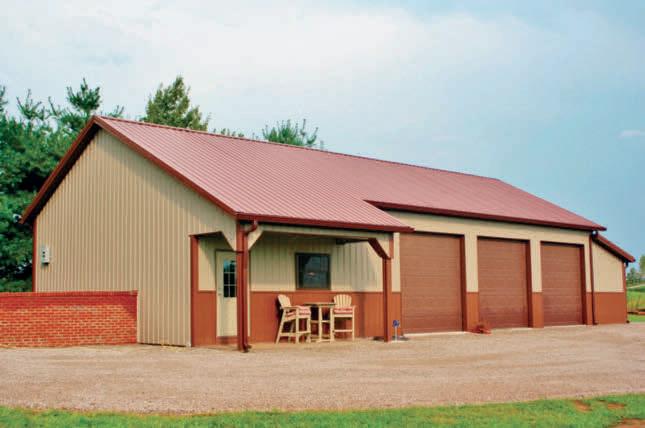





2024 CALENDAR
SEPTEMBER/OCTOBER
a visit to our charming village shops! Enjoy stunning autumn colors and exciting specials as you explore the vibrant atmosphere. www.mywestliberty.com.
SEP. 21–OCT. 20 – NWORRP Pumpkin Train, Northwest Ohio Railroad Preservation Inc., 12505 Co. Rd. 99, Findlay, Sat./Sun. 1–5 p.m. $3; 12 and under, $2. Ride our quarter-scale train to the pumpkin patch to find that special pumpkin, then take one more trip around the track to return to the station. Additional charge for pumpkins; purchase not required. 419-423-2995, www.nworrp.org, or www.facebook.com/nworrp.
and pumpkin chuckin’ all day long. The Tracks to the Past Machinery Show will feature antique machinery. 419-423-2995, www.nworrp.org, or www.facebook. com/nworrp.
OCT. 4–6 – Johnny Appleseed Festival, Antique Tractor Show, Fun Pull, and Flea Market, AuGlaize Village, 12296 Krouse Rd., Defiance. $5; 12 and under free. Enjoy our apple cider, sorghum molasses, kettle corn, and apple butter; see an operating sawmill; take a train ride around the Village ($2). School Day on Friday, Oct. 4 419-990-0107, villageauglaize@gmail. com, or www.auglaizevillage.com.
THROUGH SEP. 15 – NWORRP Museum Summer Hours, Northwest Ohio Railroad Preservation Inc., 12505 Co. Rd. 99, Findlay, Sat./Sun. 1–4 p.m. $3; 12 and under, $2 (includes 1 train ride ticket per admission). Museum tours, quarter-scale train rides, model train displays, and more. 419-423-2995, www.nworrp.org, or www.facebook.com/nworrp.
THROUGH OCT. 12 – The Great Sidney Farmer’s Market, 109 S. Ohio Ave., every Sat. 8 a.m.–noon. Vendors from the area provide great food, crafts, and more! 937-658-6945 or www.sidneyalive.org.
SEP. 4, OCT. 2 – Down on the Farm Story Time, Proving Ground Farm, 5670 E. Twp. Rd. 138, Tiffin, 10 a.m. Stories and activities geared for preschool-age children focus on farming and nature in a picturesque setting. 419-447-7073, www.conservesenecacounty. com, or find Seneca Conservation District on Facebook.
SEP. 7–8 – Findlay Flea Market, Hancock Co. Fgds., 1017 E. Sandusky St., Findlay, Sat. 9 a.m.–4 p.m., Sun. 9 a.m.–3 p.m. Free admission. Variety of merchandise: new, used, vintage items, crafts, and more. Vendors welcome! 419-619-0041 (Christine) or findlayfleamarket@gmail.com.
SEP. 18 – World War II Living History Event, Piatt Castle Mac-A-Cheek, 10051 Township Rd. 47, West Liberty, 10 a.m.–4 p.m. Free. The Greater Ohio Living History Association, WWII Mech Forces HQ returns for a 10th year for this interactive program. Become a witness to WWII patrols and skirmishes. www. piattcastle.org.
SEP. 20–21 – West Liberty Fall Open Houses, downtown West Liberty. Unlock the beauty of fall with
WEST VIRGINIA
SEP. 26–29 – Preston County Buckwheat Festival, 115 Brown Ave., Kingwood. Buckwheat cakes and sausage dinners served all day. Parades, car show, livestock shows and competitions, carnival rides, art and crafts, concerts, and more. https://buckwheatfestival.com.
OCT. 5 – Apple Butter Day, Fort New Salem, 81 Settlers Lane, Salem. We will be making apple butter on-site. 304-695-2220, director@fortnewsalemfoundation.org, or www.fortnewsalemfoundation.org.
SEP. 26 – Fourth Thursdays: “Paint LoCo Pink,” downtown Lakeview. Show your support in honor of Breast Cancer Awareness month. Live music, food trucks, and lots of pink! Attend our ceremony to celebrate with special guests and survivors while collecting stamps on your Shopping Passport. www. facebook.com/downtownlakeviewohio.
SEP. 26 – Open Air Dinner, Ross Bridge, Tawawa Park, Sidney. $75/person. Enjoy a beautiful farm-to-table dinner featuring Spot Catering, Crossway Farms, and the Shelby County Pork Producers. 937-658-6945 or www.sidneyalive.org.
SEP. 27–29 – Indian Lake Fall Festival, 13156 St. Rte. 235, Lakeview. Food trucks, arts and crafts vendors, and fall family fun! https://ohiodnr.gov/indianlake.
SEP. 27–OCT. 26 – NWORRP Halloween Express, Northwest Ohio Railroad Preservation Inc., 12505 Co. Rd. 99, Findlay, Fri./Sat. 6:30–9 p.m. $3; 12 and under. $2. Take the whole family on a non-scary train ride around our tracks to see the Halloween decorations after dark. 419-423-2995, www.nworrp.org, or www. facebook.com/nworrp.
OCT. 4 – First Fridays: Great Pumpkin Walk, downtown Bellefontaine. This not-so-scary fall celebration features inflatable attractions, music, art displays, food trucks, a vendor fair, and lots and lots of candy! Wear your best costume and get your photo taken. www.firstfridaysbellefontaine.com.
OCT. 4–6 – Findlay Fall Harvest Festival, Northwest Ohio Railroad Preservation Inc., 12505 Co. Rd. 99, Findlay, Fri./Sat. 9 a.m.–9 p.m., Sun. noon–5 p.m. $5. Family-friendly games and activities, train rides, live entertainment, bounce houses, corn cannons,
OCT. 5 – “Art in the Park” Fine Artist Show and Sale, Heritage Park, 4 E. Auglaize St., Wapakoneta, 10 a.m.–4 p.m. Free and open to the public. Familyfriendly event featuring 30 artists along the Historic Auglaize River at the Park. Each artist will have space to feature and demonstrate their art. www. facebook.com/events/1508069173446543 or https:// riversideartcenter.org.
OCT. 5 – Max’s Miles Suicide Prevention and Awareness Event, Hedges-Boyer Park, Tiffin, 8 a.m.–noon. Free. Community walk and remembrance event sponsored by the Seneca County Suicide Coalition. Pets, walkers, and runners welcome. Food trucks, local service providers, speakers, and music. Search “HOPE in Fostoria” on social media for event information.
OCT. 11 – Downtown Chocolate Walk, Sidney, 6–8 p.m. $25/person. Tour downtown businesses and gather up delicious chocolates and great deals. 937658-6945 or www.sidneyalive.org.
OCT. 11–12 – October Downtown Sidewalk Sales, Sidney. Various downtown shops will offer deals and discounts. 937-658-6945 or www.sidneyalive.org.
OCT. 12 – Boos and Brews Festival, various locations in downtown Sidney. Free. Trick or treat, costume contest, activities, and more. 937-658-6945 or www.sidneyalive.org.
OCT. 12 – Van Buren Fall Festival, Van Buren School, 217 S. Main St., Van Buren, 9 a.m.–3 p.m. Homemade apple butter, bean soup cooked over an open fire, food vendors, craft show, community garage sales, and kids’ area. Also see the Tunnel to Towers 9/11 Never Forget Mobile Exhibit. 419-889-8796 or vanburenapplebutter@ yahoo.com.

2024 CALENDAR
NORTHEAST
SEPTEMBER/OCTOBER
THROUGH OCT. 12 – Plant and Animal Fiber Exhibit, McCook House Museum, 15 S. Lisbon St., Carrollton, Fri./Sat. 10 a.m.–5 p.m. $3. See a variety of handmade items from local crafters including baskets, rush, reed, caned bottom chairs, woven rugs, wall hangings, knitted and crocheted items, and much more. 330-437-9715 or kathorn4120@ gmail.com.
SEP. 9–21 – “Celebrate the Constitution,” Historic Fort Steuben, 120 S. 3rd St., Steubenville, Mon.–Sat. 10 a.m.–4 p.m., Sun. 11 a.m.–4 p.m. Free. Annual exhibit and activities focusing on the nation’s founding document and the issues and personalities of the time. 740-283-1787 or www. oldfortsteuben.com.
SEP. 15 – Annual Harvest of the Arts, 101 Willard Memorial Square, Wellington, 11 a.m.–4 p.m. Free admission and parking. About 60 fine and folk art vendors, a handmade quilt raffle, and lunch in our Friends Café. Fundraiser for community programming for the library. 440-647-2120 or www. herrickliboh.org.
SEP. 20–21 – Brigade of the American Revolution, Historic Fort Steuben, 120 S. 3rd St., Steubenville. $6; ages 6–12, $3; under 6 free. Reenactors will demonstrate the maneuvers and armaments used
SOUTHWEST
THROUGH OCT. 30 – Bluegrass Wednesdays, Vinoklet Winery, 11069 Colerain Ave., Cincinnati, Wed. 6:30–8:30 p.m. Enjoy dinner, wine, and an evening of free entertainment by Vernon McIntyre’s Appalachian Grass. Reservations recommended. 513-385-9309, vinokletwinery@fuse.net, or www. vinokletwines.com.
SEP. 14 – Troy Porchfest, downtown Troy, 10:30 a.m.–7 p.m. Imagine 40 bands playing on 40 porches throughout the Southwest Historic District, with 7 new concerts each hour! Pick up a walkable map of the event and choose your favorite bands. Food court, Artisan Tent Village, and closing concert at the Hayner. www.troyhayner.org/porchfest.html.
SEP. 15, OCT. 5 – White Water Shaker Village Tour, 11813 Oxford Rd., Harrison, 2–5 p.m. Free.
during the early settlement and development of America. 740-283-1787 or www.oldfortsteuben.com.
SEP. 28 – Burton Antiques Festival, Geauga Co. Fgds., 14373 Cheshire St., Burton. Early buyers, 8–10 a.m., $25; general admission 10 a.m.–1 p.m., $10; 1–4 p.m., $5. Antique, vintage, and midcentury furniture, along with vintage jewelry, primitives, stoneware, postcards, and much more. 740-9985300 (Kay Puchstein), puchs2@yahoo.com, or www. burtonantiquesmarket.com.
SEP. 28 – Lorain County Beekeepers Association End of Summer Classic, Lorain Co. Fgds., 23000 Fairgrounds Rd., Wellington, 9 a.m.–3 p.m. Classic cars, raffles, and vendors with locally produced products. This fundraiser will support our goal to build a year-round learning facility at the fairgrounds for future beekeepers and farmers. https:// loraincountybeekeepers.org/end-of-summer-classic.
OCT. 4 – “Zoar and the Presidents,” 198 Main St., Zoar, 11 a.m. – 4 p.m. $7. Open to all public, private, and homeschool students. Meet U.S. presidents and other historical figures who were active during Zoar’s era as a communal settlement from 1817 to 1898 Reservations requested. 800-262-6195 or www. historiczoarvillage.com.
OCT. 5 – Apfelfest, 254 E. 4th St., Zoar, 11 a.m.–4 p.m. $10; 12 and under free. Celebrate the history of Zoar Village with a weekend filled with apples, apple cider, apple treats, demos, fall-related vendors, and more. 800-262-6195 or www. historiczoarvillage.com.
OCT. 5 – Wayne County Stitchers Sewing Fest, Church of the Cross, 5100 Cleveland Rd., Wooster, 9 a.m.–3 p.m. $10 admission; no registration. Classes, door prizes, raffles, boutique, and fabric fair. A fun day of creative learning! Email porterjrsn667@yahoo. com for more information.
Established in 1823, White Water is one of the 24 Shaker communal villages founded in the United States. Learn about the daily life of a Shaker and the businesses they conducted, check out our collections of Shaker goods, and explore the stable, barns, and historic outbuildings. www. whitewatervillage.org.
SEP. 20, OCT. 18 – Bluegrass Night, Fibonacci Brewing Company, 1445 Compton Rd., Cincinnati, 7–9 p.m. Free. Enjoy lively bluegrass music by Vernon McIntyre’s Appalachian Grass, a wide variety of craft beers at the Beer Garden, and food truck eats. 513-832-1422 or http://fibbrew.com.
SEP. 21–22 – Preble County Pork Festival, Preble Co. Fgds., 722 S. Franklin St., Eaton. Free admission/ parking. Parade Sat. 10:30 a.m. The best pork chops, pulled pork, ham sandwiches, and sausage in the region. www.porkfestival.org.3
SEP. 27–29, OCT. 4–6, 11–13 – Halloween Campout/Trick-or-Treat, Hueston Woods State Park, 6301 Park Office Rd., College Corner. Free. Everyone is welcome to join us for the spooktacular events happening in our campground. Please call 513523-6347 or visit www.ohioodnr.gov for additional information.
OCT. 1 – Music Live at Lunch: Vernon McIntyre’s Appalachian Grass, Christ Church Cathedral, 318 E. 4th St., Cincinnati, 12: 10–12:50 p.m. Free. Bring your own lunch or purchase a box lunch
OCT. 5–6, 12–13, 19–20 – Fall Foliage Tours, Lorain and West Virginia Railway, 46485 St. Rte. 18, Wellington, departure time 1:30 p.m. The perfect way to spend an hour or two on a Saturday or Sunday in October. Tickets available at the station on days of operation. 440-647-6660 or www.lwvry.org.
OCT. 6 – Cleveland Comic Book and Nostalgia Festival, Doubletree by Hilton Cleveland/Westlake, 1100 Crocker Rd., Westlake, 10 a.m.–4 p.m. $5; 6 and under free. Free parking. Comic and toy vendors, guest comic creators, hourly prizes. 330-462-3985, jeff@harpercomics.com, or www.harpercomics.com.
OCT. 6 – First Fridays on Fourth, 155 N. 4th St., Steubenville, 6–10 p.m. Free. Monthly themed celebration featuring art, crafts, games, food trucks, live entertainment, and activities to stimulate the imagination. www.theharmoniumproject.org/ first-Fridays.
OCT. 11–12 – Valley Quilt Guild Quilt Show, Sacred Heart Church Parish Center, 320 Fair Ave. NE, New Philadelphia, 10 a.m.–3 p.m. $5 100-plus quilt display, demonstrations, raffle quilt and baskets, bed turning, vendors, quilters’ café, boutique, and more. www.facebook.com/groups/valleyquiltguild.
OCT. 11–12, 18–19, 25–26 – Ghost Tours of Zoar, 198 Main St., Zoar, 6:30–8:30 p.m. $19. Learn about supernatural encounters shared by staff, visitors, and residents of Zoar on a walking tour of the village. For adults and children over the age of 12. Reservations required. 800-262-6195 or www. historiczoarvillage.com.
OCT. 13 – Jesse Smith: Finger Style Guitar, Wadsworth Public Library, 132 Broad St., Wadsworth, 2–3 p.m. Free, but registration recommended. 419853-6016 or www.ormaco.org.
on-site. 513-842-2066, sroby@cccath.org, or https://cincinnaticathedral.com/wp-content/ uploads/2023/08/Music-Brochure-2023-2024.pdf.
OCT. 4–6 – Octoberfest, Cincinnati Donauschwaben Society, 4290 Dry Ridge Rd., Cincinnati, Fri. 5–11 p.m., Sat. 1–11 p.m., Sun. 1–9 p.m. Voted “Most Authentic Octoberfest” in Cincinnati area, with great food, music, and dancers. Come out and join us for a day of Gemuetlichkeit! www.cincydonau.com.
OCT. 5 – Free Family Program: Trick or Treat Safari, Wild Hearts African Farm, 7010 Jordan Rd., Lewisburg, 12–3 p.m. Led by Amanda Badger. Registration required. 937-962-5561, pcpdevents@ gmail.com, or www.preblecountyparks.org.
OCT. 12 – USSA Steinholding Competition, Liberty Home German Society, 2361 Hamilton Cleves Rd., Hamilton, 5–10 p.m. Bad Habit Band, 6–10 p.m. 513571-6198, www.libertyhome.net, or follow Liberty Home Association on Facebook.
OCT. 12–13 – Ohio Sauerkraut Festival, Historic Main Street, Waynesville, Sat. 9 a.m.–8 p.m., Sun. 9 a.m.–6 p.m. Sample homemade sauerkraut and many kraut-containing foods. Non-kraut foods also available. 513-897-8855 or https://sauerkrautfestival. waynesvilleohio.com.
CENTRAL
THROUGH SEP. 28 – Sunbury Farmers Market, 36 Cherry St., on the Square of Sunbury, 9 a.m.–1 p.m. Offering local products — handmade, homemade, or homegrown. Vendors welcome. 740-513-9192 or sunburyohiofarmersmarket@gmail.com.
THROUGH OCT. 26 – Coshocton Farmers Market, 22442 Co. Rd. 1A, Coshocton, Sat. 8:30 a.m.–noon. Fresh, locally grown, in-season produce; baked goods; and handmade artisan crafts. www.facebook. com/coshoctonfarmersmarket or market.manager@ coshfarmmarket.org.
THROUGH OCT. 27 – Rock Mill Days, Stebelton Park at Rock Mill, 1429 Rockmill Place NW, Lancaster, Wed./ Sat. 11 a.m.–2 p.m., Sun. 1–4 p.m. Tour the restored 1824 gristmill, walk the covered bridge, and view the waterfall near the headwaters of the Hocking River. 614-321-4833 ext. 103 or www.fairfieldcountyparks.org/events.
SEP. 6, OCT. 4 – First Friday Art Walk, downtown Zanesville, 5–8 p.m. Come downtown on the first Friday of each month, when all our participating galleries, studios, and small businesses are open at the same time! https://artcoz.org/arts-district-map.
SEP. 10, 17 – Friendly Ties Square Dance Club Lessons, Pickerington Senior Center, 150 Hereford Dr., Pickerington, 7–9 p.m. First two lessons are free; $5/person per class after Sep. 17. Come join in the fun and reap the benefits — physically, mentally, and emotionally. 614-316-5838 or www.friendlyties.org.
SEP. 12, OCT. 10 – Inventors Network Meetings, Rusty Bucket, 3901 Britton Parkway, Hilliard, 43026 (614-7775868, MyRustyBucket.com), 7 p.m. Informal meetings for networking and invention-related discussion. 614-4700144 or www.inventorscolumbus.com.
SOUTHEAST
THROUGH NOV. 2 – Athens Farmers Market, Athens Community Center, 701 E. State St., Athens, Wed. 9 a.m.–noon. Open year-round Sat. 9 a.m.–noon. Voted Ohio’s #1 favorite farmers market! 740-593-6763 or www.athensfarmersmarket.org.
SEP. 20–21 – The National Road Quilt Guild Quilt Show, St. Clairsville Fairgrounds (near Ohio University Eastern Campus), 45420 Roscoe Rd., St. Clairsville, Fri. 10 a.m.–5 p.m., Sat. 10 a.m.–4 p.m. $5. Free parking. No steps; air-conditioned building. Many vendors, quilt raffle, and gift basket raffle. 740-449-2697 or find The National Road Quilt Guild on Facebook.
SEP. 21 – Ghost Walk, downtown Chillicothe, 10 a.m.–6 p.m. $10. Tour five downtown locations where
SEP. 14–15 – Harvest Celebration, Smeck Park, 7395 Basil Rd, Baltimore, 11 a.m.–4 p.m. Free. Watch Fairfield County Antique Tractor Club members bring in the harvest using antique farm machinery. Games and activities for all ages, demos, displays, vendors, music, food trucks, and more. 740-681-7249 ext. 105 or www. fairfieldcountyparks.org/events.
SEP. 19–NOV. 14 — Stephanie Rond “Spacewalkers” exhibit, McConnell Arts Center, 777 Evening St., Worthington, Tue.–Fri. 10 a.m.–9 p.m., Sat. 10 a.m.–5 p.m. Free. Opening reception 6–8 p.m. Sep. 19; artistguided gallery tour 7 p.m. Oct. 3 614-431-0329 or www. mcconnellarts.org.
SEP. 21 – Fall Foliage Tour and Hike, Canal Park, Circleville, 11 a.m. Guided hike to look at the small wondrous changes that take place every fall in our natural spaces. Dress for the fall weather and terrain. An adult must accompany all children under 12. Registration required: email mellis@pickawaycountyohio.gov. Program will be canceled in the case of inclement weather. www.pickawaycountyparks.org.
SEP. 27–28 – Pickerington Oktoberfest, 80 W. Church St., Pickerington, Fri. 3–10 p.m., Sat. 12–10 p.m. Free admission. Enjoy beer, cider, wine, and cocktails, live music, food, games. Family friendly; minors must be accompanied by an adult. Beer Mile Run on Saturday morning. 614-382-2452 or www.pickeringtonvillage.com.
SEP. 27–28 – Sims Fall Festival, 11300 ChillicotheLancaster Rd., Amanda, Fri. 2–8 p.m., Sat. 10 a.m.–4 p.m. Free. Civil War encampment and display, live music, kids’ activities, beans and cornbread, firing of Gen. Sherman’s cannon, pumpkins and mums for sale, and more! 740-969-2225 or www.simsfallfestival.com.
SEP. 28 – Ghost Stories and Night Hike, Canal Park, Circleville, 7:30 p.m. Join us as we listen to a ghost story, take a special after-dark hike, and participate in an interactive nocturnal activity. Dress for the fall weather and terrain. An adult must accompany all children under 12. Registration required: email mellis@pickawaycountyohio.gov. Program will be canceled in the case of inclement weather. www. pickawaycountyparks.org.
SEP. 28–29 – Frontier Spirit 1799, Alley Park, 2805 Old Logan Rd. SE, Lancaster, 10 a.m.–5 p.m. Free. Step back in time to see what life was like for the first settlers in the Ohio Territory, featuring characters from early Fairfield
you will hear stories of the ghostly encounters that have been experienced at each location. www. chillicothehalloweenfestival.com/ghost-walk.
SEP. 21 – Oktoberfest, East Second Street, Chillicothe, 4–10 p.m. $5. Annual family-friendly event with wiener dog races, face painting, DJ, live music, and traditional German fare and beer along with beer chugging, yodeling, and stein-holding contests. www. downtownchillicothe.com.
SEP. 21–22 – Appalachian Foothills Fall Festival and Old Iron Power Club Show, Noble Co. Fgds. (exit 25 off I-77), Caldwell. $5; 10 and under free. Two festivals in one! Gas engines, tractors, crafts, flea market, live bluegrass and country music, chicken BBQ, one-room school, covered bridge, log cabin tours, and more. 740934-2258 (Marissa Winland) or www.oldironpowerclub. com.
SEP. 26–29 – Barnesville Pumpkin Festival, downtown Barnesville. Parade, fun contests and activities, live music, a variety of pumpkin-based food, and the Great Pumpkin Weigh-Off. 740-425-2593 or www.barnesvillepumpkinfestival.com.
SEP. 28–29 – Athens Antique Machinery Show, Athens Co. Fgds., 286 W. Union St., Athens, 9 a.m.–3 p.m. $5/day. Antique and classic tractors, old farm
County. Demos of period crafts, period music, children’s games, and more. frontierspirit1799@gmail.com or www. frontierspirit.org.
SEP. 28–29 – Hocking Hills Artists and Craftsmen Association Fall Show, Hocking Hills Lodge and Convention Center. 20020 St. Rte. 664 S., Logan, 1 mile south of Old Man’s Cave, Sat. 10 a.m.–5 p.m., Sun. 11 a.m.–4 p.m. Refreshments available. www. hockinghillsartistsandcraftsmen.com.
SEP. 29 – Marysville Toy Show, Union Co. Fgds., Beef Barn, 845 N. Main St., Marysville, 9 a.m.–3 p.m. $6; 12 and under free; early buyer (8–9 a.m.) $12. Free parking. Die-cast cars, action figures, model kits, farm toys. Find Marysville Toy Show on Facebook.
OCT. 5 – “Crafts for a Cure for Alzheimer’s” Craft Show, Isla Grande Farms Pavilion, 2730 Harding Hwy. W., Marion, 43302. Crafts, food, raffles. Hosted by Kenya and Rodney Mulholland. 740-262-2286, craftsforacure@ yahoo.com, or find us on Facebook.
OCT. 5 – Fall Tree ID and Leaf Hike, PCPD HQ, 16405 U.S. 23, South Bloomfield, 10 a.m. Learn identification methods for trees based on tree bark and leaves. Dress for the fall weather and terrain. An adult must accompany all children under 12. Registration required: email mellis@pickawaycountyohio.gov. Program will be canceled in the case of inclement weather. www. pickawaycountyparks.org.
OCT. 5–6 – “Quilting Thru the Seasons” Quilt Show, Park Avenue Elementary School, Mount Gilead, Sat. 10 a.m.–5 p.m., Sun. 11 a.m.–4 p.m. Hosted by Morrow County Quilting Guild. Raffle quilt, silent auction, sale table, freewill donation, bed turning, and over 200 quilts on display. 419-946-5344 (Cheryl Jason).
OCT. 11–13 – Columbus Italian Festival, St. John the Baptist Italian Catholic Church, 720 Hamlet St., Columbus, Fri. 5–11 p.m., Sat. noon–11 p.m., Sun. noon–7 p.m. $10; 12 and under free. 614-294-8259 or www.columbusitalianfestival.com.
OCT. 12 – Grandma Gatewood Fall Color Hike, Hocking Hills State Park, 19852 St. Rte. 664 S., Logan, 9 a.m. A strenuous hike that spans 6 miles on the Grandma Gatewood trail from Old Man’s Cave to Cedar Falls and back. Dress for the fall weather and terrain. Meet at the Visitor Center. 740-385-6841 or www. thehockinghills.org/Events.htm.
and oil field engines, craft and flea markets, working steam engines, sawmill, stone-ground cornmeal, live entertainment, 500 Visa raffle, and more. Food served all day. 740-664-2112 (Bruce Russell), 740541-0423 (Dave Llewellyn), or www.facebook.com/ AthensCountyAntiqueMachineryClub.
OCT. 3–26 – The Frankenstein Experience at Haunted Mountain, Sugarloaf Mountain Amphitheater, 5968 Marietta Rd., Chillicothe, Thur.–Sat. 6:30 p.m. $10–$40. Enjoy a spine-tingling adventure with a live production, haunted trail, films, escape rooms, and more! www.hauntedmountain.org.
OCT. 4–6 – Paul Bunyan Show, Guernsey Co. Fgds., 335 Old National Rd., Lore City (Cambridge), Fri./Sat. 8 a.m.–5 p.m., Sun. 9 a.m.–3 p.m. $6–$12; 6 and under free; free for veterans. The original American forestry show, featuring lumberjack competitions, demos and clinics, wood crafts, and much more. 888-388-7337 or www.ohioforest.org.
OCT. 11–13 – Chillicothe Halloween Festival, Yoctangee Park, 1 Enderlin Circle, Chillicothe, Fri./ Sat. 10 a.m.–10 p.m., Sun. 10 a.m.–5 p.m. Free. Live entertainment, vendors, haunted attraction, Kids’ Zone with inflatables, car show with trunk or treat, costume contest, and much more. www. chillicothehalloweenfestival.com.


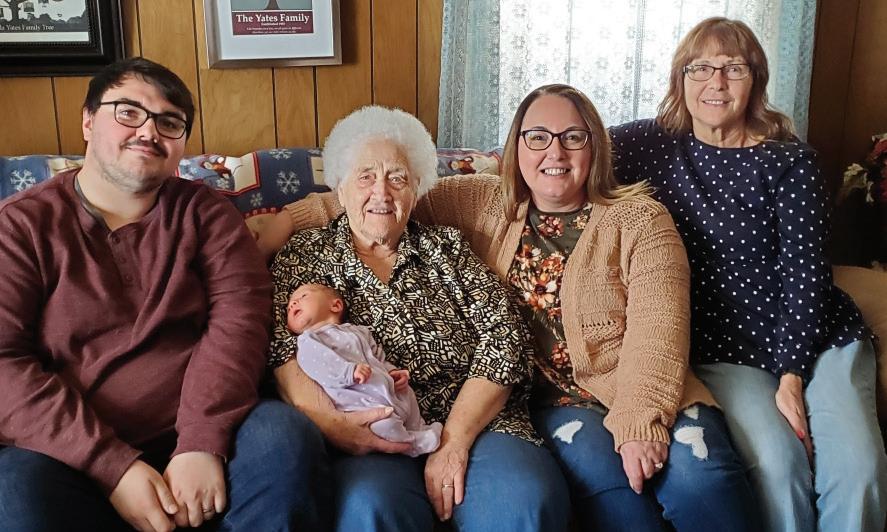
1 2 3 4 5 6

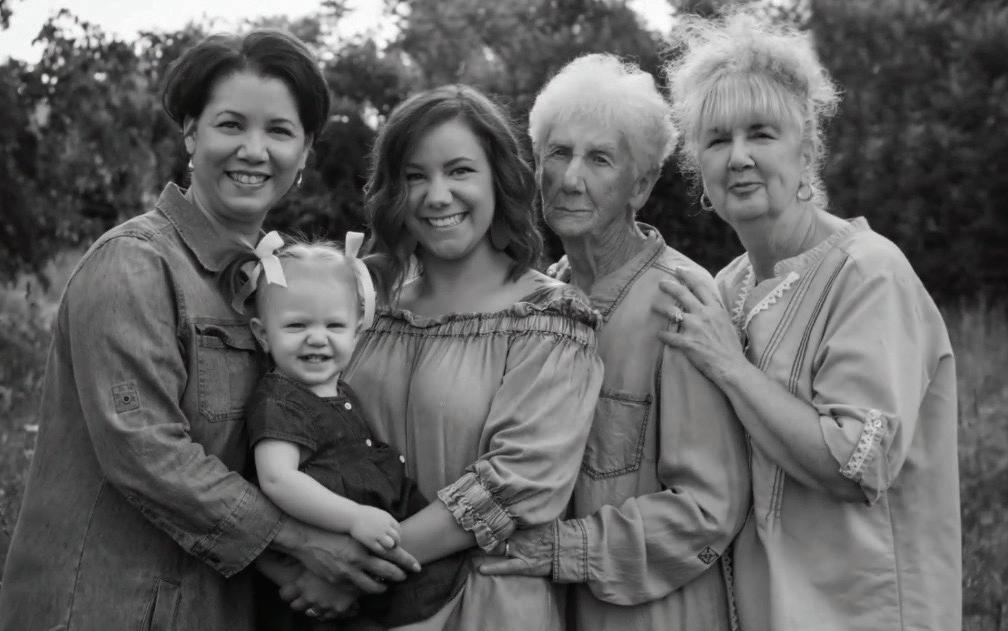
1: My dad, Joe, my brother Scott, my nephew Mitch, and my great-nephew Luke — JoAnna Griffin, Washington Electric Cooperative member
2: Florence Windau, Mandi Breyman, Winnie Lease, Janeen Melroy, and Becky Wilhelm — Janeen Melroy, North Central Electric Cooperative member
3: Great-great-grandma Wilma Kieffer holding Bentley Jeffries Babcock, backed by grandpa Ben Heitman; great-grandma Melisa Heitman, and Bentley’s mom, Madilynn Heitman — Melisa Heitman, Tricounty Rural Electric Cooperative member
4: Jimmy Hall, great-grandson; Ruth Yates, great-great-grandma holding Luna Hall, great-great-
granddaughter; JoAnn Hall, grandma; and Nedra Hall, great-grandma. — Nedra Hall, Tricounty Rural Electric Cooperative member
5: Me with my daughter, Kay Sigler; my granddaughter, Jonetta Boggs; my greatgranddaughter, Bailey Dennis; and my greatgreat-granddaughter, Louse Dennis — Kathryn Sigler, Buckeye Rural Electric Cooperative member
6: Great-grandma Chris with her children, her children’s children, and her children’s children’s children — Nina and Jeff Craig, Hancock-Wood Electric Cooperative members
For December, send “The night before Christmas” by September 15. For January, send “On the slopes” by October 15. Upload your photos at www.ohiocoopliving.com/memberinteractive. Your photo may be featured in our magazine or on our website! Send us


Bring your completed entry form to the Ohio’s Electric Cooperatives education center on Wheat Street at the 2024 Farm Science Review.
Name:
Electric co-op name:
Email address:
*Must be an Ohio electric cooperative member to enter and win. Must be original entry form — no photocopies.
Molly Caren Agricultural Center | London, Ohio
Sept. 17–19, 2024
Sponsored by The Ohio State University, Farm Science Review is the largest agricultural event in our region, drawing more than 130,000 people each year.
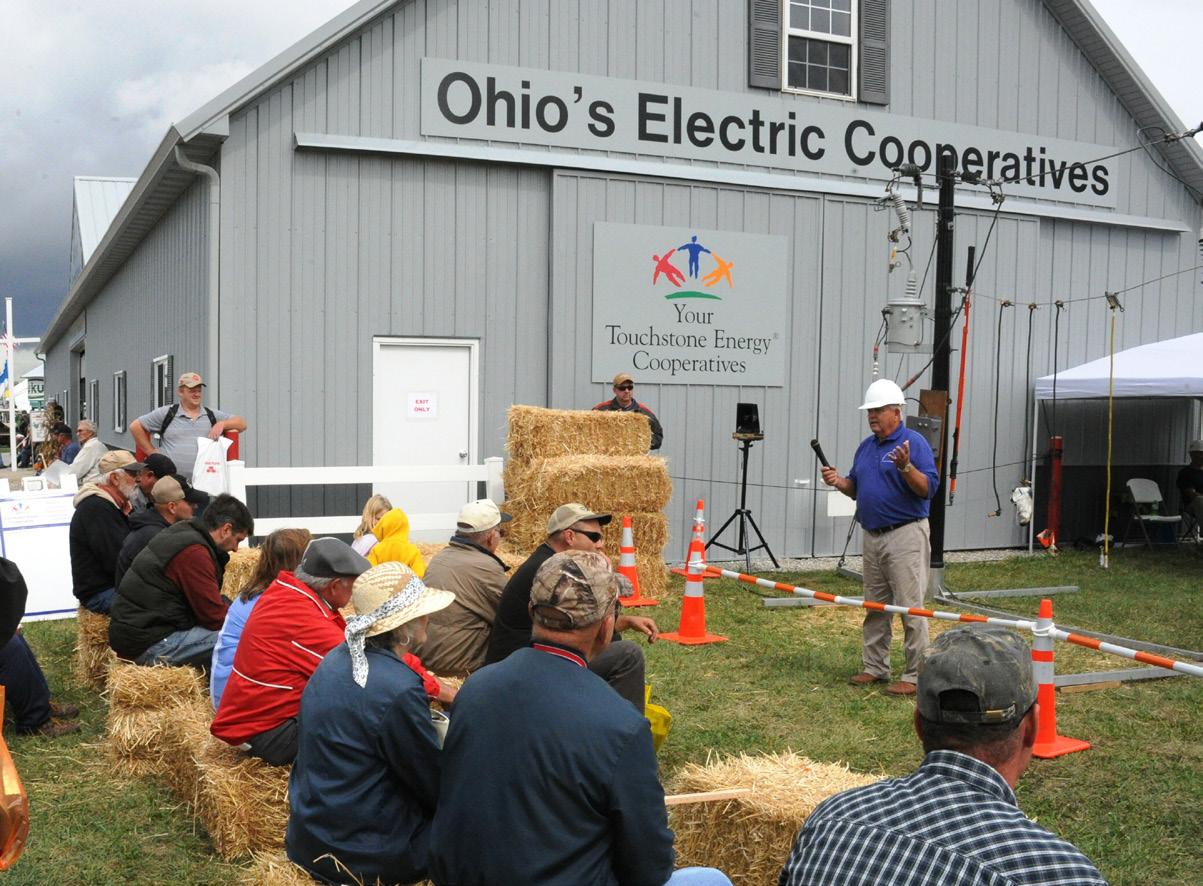
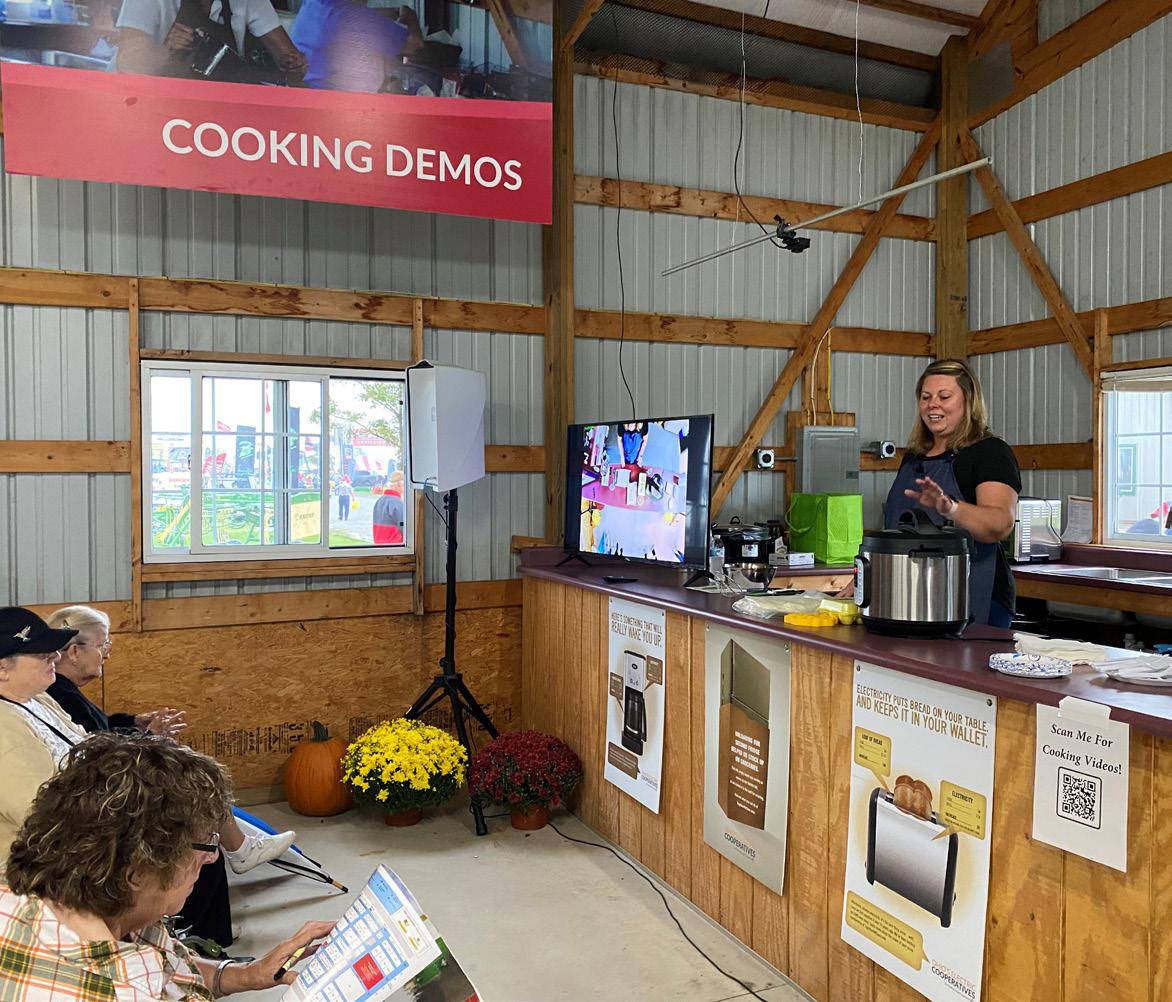
Stop by the Ohio’s Electric Cooperatives education center for displays, energy-saving tips, demonstrations, and free popcorn!

